
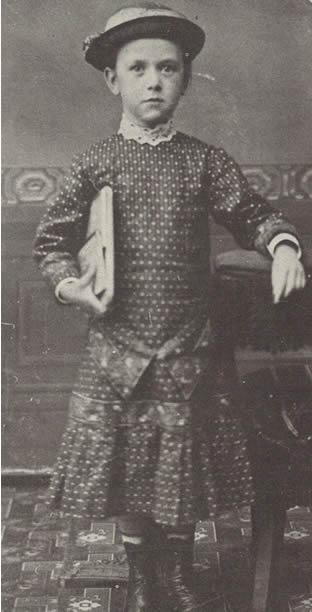
Jennie
Clemens, (1855 - 1864)
Samuel Clemens's niece |
MARK TWAIN'S QUARREL
WITH
UNDERTAKERS:
It All Begins with
Jennie
"Tragedy always leaves a psychic scar upon a site, and there
is nothing so heart-rending as the death of a beloved child." -
Richard Senate,
historian and author
|
_____
Introduction
"Let us endeavor so to live that when we come to die even
the undertaker will be sorry." Samuel Clemens included that maxim in
"Pudd'head Wilson's Calendar" in 1894. At first glance the famous
quote appears humorous, motivating and encouraging the reader to live a life
filled with good deeds. But there is a darker side to the quote that reveals
a resentment Sam Clemens held for the occupation of undertakers -- men who
made their living by taking advantage of sorrow. This was a view he formulated
in 1864 when he lived in the territory of Nevada and a view that he would
continually express throughout his lifetime.
The Clemens Family Goes West
Samuel Clemens and his older brother Orion left St. Louis, Missouri
on July 18, 1861 enroute to the territory of Nevada. Abraham Lincoln had been
inaugurated as president of the United States on March 4, 1861 and Orion,
who had actively campaigned for Lincoln had received a political appointment
as secretary of Nevada territory. Sam had been a Mississippi steamboat pilot
until the Civil War broke out a few months earlier and closed down commerce
and travel on the great river. Sam had agreed to pay the travel passage for
them both from Missouri to Nevada when Orion promised to make Sam his personal
secretary -- an unfunded position. The brothers traveled by steamboat up the
Missouri River to Saint Joseph, Missouri. At St. Joseph they boarded a stagecoach
headed for Carson City, seventeen hundred miles west. Orion was leaving behind
a string of unprofitable jobs as a newspaper editor, publisher and printer
in Missouri and Iowa in hopes of finally finding a meaningful occupation in
government service in Nevada territory.
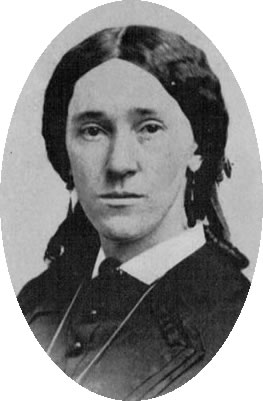
Mollie
Stotts Clemens
|
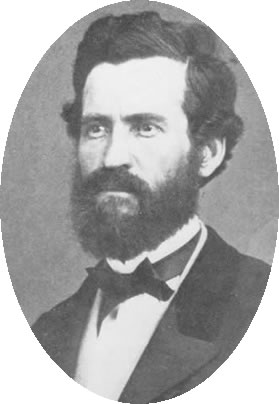
Orion
Clemens |
Orion had married Mary Eleanor "Mollie" Stotts of
Keokuk, Iowa in December 1854 and their daughter Jennie was born the following
September 1855. Orion had requested an advance on his future salary of $1,800
a year in order to take Mollie and Jennie with him to Carson City that summer
in 1861. The request for a salary advance was denied and it would be October
1862 before Mollie and Jennie would make the trip to Nevada and reunite the
family. At the first territorial legislative session in 1861, the legislators
passed a law enabling Orion to collect fees for providing certified documents,
copies of laws, and filing certificates of incorporation. The added income
enabled Orion to erect one of the finest homes in Carson City at the corner
of Spear and Division street. The two-story home with a circular porch and
bay window was constructed for $12,000, a princely sum in the 1860s. Orion
furnished the home with walnut furniture, a grand piano, and a special little
rocking chair for Jennie. The home soon became a social center for the town
as Mollie became a well-loved and popular hostess.
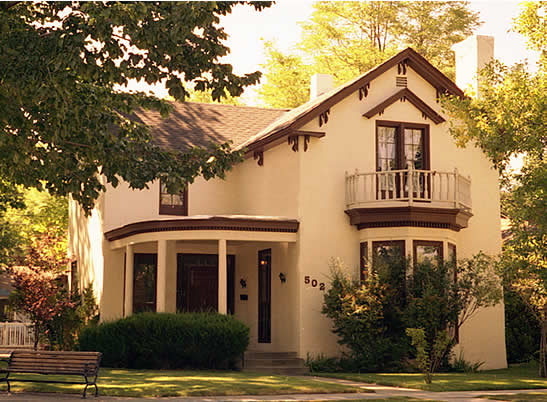
The home
Orion Clemens built for Mollie and Jennie still stands in Carson City, Nevada.
Photo © R. Kent Rasmussen, 2002.
_____
Jennie Clemens -- "A Heaven Born Child"
Orion and his family joined the First Presbyterian Church of
Carson City and worked to raise money for a new church building. Jennie worked
to raise money to buy the church a Bible for the pulpit. She attended school
at Miss Hannah Keziah Clapp's Sierra Seminary. By all accounts she was bright
and loved to read the family Bible. She told Mollie she often prayed at school
for assistance when she had difficulties. Her parents told friends that Jennie
had read Bunyan's Pilgrim's Progress. Family friend and newspaper reporter
Dan DeQuille, a frequent visitor in Orion's home, told of Jennie's joy of
reading:
I was amused by a little daughter of his who was turning over the leaves
of a work on geography, suddenly starting up and exclaiming gleefully, --
'Good, good! I have found it! I've found it at last!' Found what?' her father
asked. 'Why look there -- "God fishing off New Foundland"! He
looked and read under a picture, 'Cod Fishing off New Foundland.' (Mack,
Nevada Historical Society Quarterly, p.93).
Among the few surviving items once owned by Jennie Clemens is her copy of
a book titled The Young Artists, and Other Stories that was presented
to her by Judge George Turner, Chief Justice of Nevada Territory in 1863.
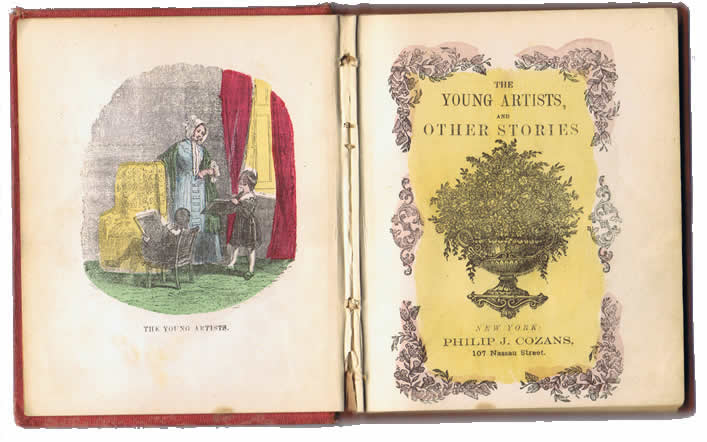
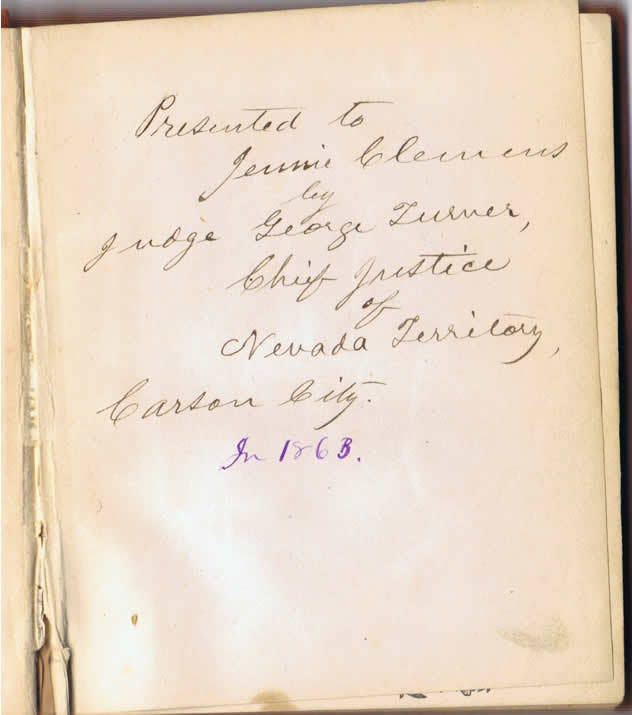
Jennie's
book was given to Sam's daughter Clara Clemens in 1880 by Orion and Mollie.
The book is now in the Kevin Mac Donnell collection.
Photos courtesy of Kevin Mac Donnell.
_____
Mark Twain, Influential Newspaper Reporter
After the first territorial legislative session ended in late
1861 Sam, who had received a few month's salary for serving as a legislative
clerk, drifted into silver mining in the nearby regions. Unable to strike
it rich, in August 1862 Sam accepted a position as a reporter for the Territorial
Enterprise in Virginia City, about fifteen miles northeast of Carson City.
When the second territorial legislature convened in November 1862, Sam traveled
to Carson City as a reporter covering the proceedings and lodged with Orion,
Mollie and Jennie.
When he wasn't reporting on the territorial legislature, Sam
Clemens wrote local news stories about Virginia City and Carson City. On
January 31, 1863 Sam Clemens, writing from Carson City to the Territorial
Enterprise, signed his story "Mark Twain." It is the first
known usage of his famous pen name and some historians theorize the name was
invented in Jennie's bedroom.
When there wasn't a lot of news to be found, Sam Clemens manufactured
it. Gold mines, massacres, and petrified men were only a few of the topics
and hoaxes he wrote about. Descriptions and good-natured jokes related to
undertakers were common. When John Van Buren Perry was elected City Marshall
of Virginia City in the spring of 1863, Sam wrote about the size of his wooden
shoes:
In 1835, during a great leather famine, many people were obliged to wear
wooden shoes, and Mr. Perry, for the sake of economy, transferred his boot-making
patronage from the tan-yard which had before enjoyed his custom, to an undertaker's
establishment -- that is to say, he wore coffins ("City
Marshall Perry," Territorial Enterprise, March 3, 1863.)
In August 1863 he visited the curative hot mineral waters at Steamboat Springs
near Virginia City, known for their medicinal properties. He described miners
who visited the springs hoping for a cure:
More than two-thirds of the people who come here are afflicted
with venereal diseases -- fellows who know that if "Steamboat" fails
with them they may as well go to trading feet with the undertaker for a box
-- yet all here agree that these baths are none the less potent where other
diseases are concerned (
"Letter
from Mark Twain," Territorial Enterprise, August 25, 1863).
Sam spent time in Orion's home over the next year, sometimes
walking the distance from Virginia City to Carson City, and writing up local
news reports as Nevada transformed itself from a territory into a state. When
the constitutional convention was in session from November to December 1863
Sam was again on hand to report the proceedings. With his brother Orion installed
as secretary of Nevada territory, Sam's unmatchable writing skills, and his
position writing for the most influential paper in Nevada, Sam Clemens wielded
considerable influence. Sam's official biographer Albert Bigelow Paine claimed
that Sam "could control more votes than any legislative member, and with
his friends ... could pass or defeat any bill offered" (Paine, p. 244).
He used his influence to aid causes that were special to Orion and his family.
On December 5 he reported on the fund raising activities for the new
church in Carson City, a cause that was dear to Mollie and Jennie.
In January 1864 Sam visited Jennie's school Miss Clapp's Sierra
Seminary. In a report published in the Territorial Enterprise and dated
January 14, Sam lobbied the territorial legislators to continue their funding
for the school. No doubt, little Jennie was in attendance the day her uncle
Sam visited and took much delight in later reading his playful newspaper report
which described her classmates' activities that day. The article titled "Miss
Clapp's School" contains numerous parallels to the descriptions of
students and classrooms Clemens would later employ in his novel The Adventures
of Tom Sawyer. On January 27, 1864 Sam Clemens delivered one of his earliest
public speeches at the Carson City courthouse. The audience was charged a
dollar admission -- the funds raised, approximately $200, were to be used
to benefit the new Presbyterian church under construction. Sam wrote about
the speech the next day for a report
published in the Territorial Enterprise. (A photo of the church
is online at Western
Nevada Historic Photo Collection.)
_____
Death of Jennie Clemens - A "Signal Event"
Tragedy struck the Clemens family two days after Sam delivered
his church fundraising speech. On January 29, eight-year-old Jennie was stricken
with spotted fever. In her delirium she repeated the Lord's Prayer while Sam,
Orion and Mollie kept watch at her bedside. Jennie, an only child, died at
6 PM on February 1, 1864. Jennie was buried at 10 AM on February 3 and the
territorial legislature adjourned to attend the funeral. When news of Jennie's
death reached her grandmother Jane Clemens, Jane wrote to Mollie and Orion,
"Jennie was an uncommon smart child she was a very handsome child but
I never thought you would raise her, she was a heaven born child, she was
two [sic] good for this world" (Fanning, p. 91). Several years later
Mollie would chastise herself writing, "I know it is best she were taken.
I was not fit to bring her up" (Fanning, p. 91). Philip Fanning, Orion's
biographer has described Jennie's death as a "signal event" in the
lives of the family -- an event that has been largely overlooked by previous
biographers. Jennie's death spelled the end of a way of life Orion and Mollie
had come to love -- the couple remained childless thereafter and Orion's political
career declined into nothingness. Jennie's uncle Sam Clemens would grieve
in his own way and take from Jennie's death a particular view of undertakers
that would permeate through his stories, books and letters as Mark Twain lashed
out at the men who turned a profit from sorrow and death.
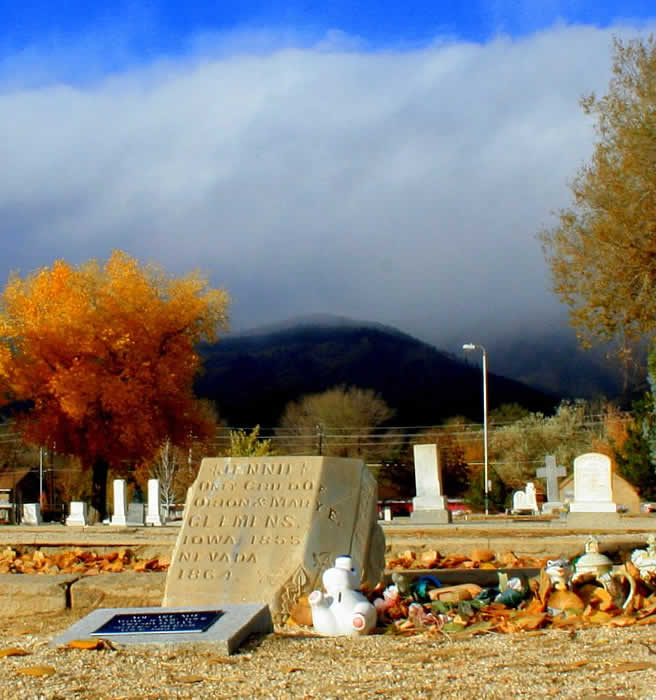
Jennie Clemens
grave marker at plot 1E-07-06 in Lone Mountain Cemetery (also known as Wright
Cemetery) in Carson City, Nevada.
Photo courtesy of Bob Wilkie, 2008 randomnevadablogspot.com
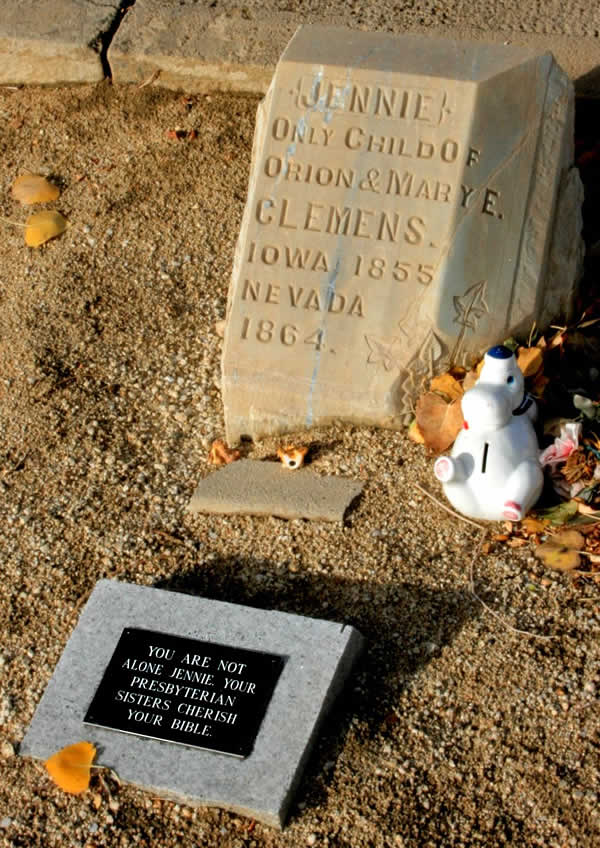
Jennie's marker was provided by Abraham Curry, a leading citizen of Carson
City at the time of her death.
Jennie's grave continues to be maintained by local residents.
Photo courtesy of Bob Wilkie, 2008 randomnevadablogspot.com
_____
Mark Twain and the Carson City Undertaker - February 1864
The undertaker for Carson City, Nevada in 1864 was Samuel C.
Wright. Wright was born in Syracuse, New York April 3, 1831 and had gone west
as a young man, settling first in Downieville, California. He relocated to
Carson City in the early 1860s. Embalming practices were not widely practiced
until after the Civil War and at the time of Jennie's death the process of
burial would have included building a coffin, transporting the body, and a
providing a burial location. The 1870 census for Carson City lists the occupation
of S. C. Wright, not as an undertaker, but as a "joiner" -- a carpentry
trade. Also living in the same household with Wright in 1870 was David Riley,
a cabinet maker. In the 1880 census for Carson City, Wright was listing his
occupation as a carpenter.
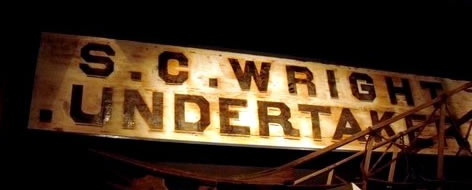
S. C. Wright
Undertaker sign was found in the attic of a home in Carson City, Nevada which
was being torn down in the 1990s. It is now in the Nevada State Museum. Photo
courtesy of Bob Wilkie, 2010 randomnevadablogspot.com
Four days after Jennie's death, in a letter to the Territorial
Enterprise dated
February 5, 1864 and published February 12 Sam Clemens lashed out at the
Carson City undertaker for extortion and taking advantage of people in sorrow.
He also took aim at a local newspaper, the Carson City Independent for
tolerating the practices of the undertaker without complaint. In an item titled
"Concerning
Undertakers" he wrote:
There is a system of extortion going on here which is absolutely terrific,
and I wonder the Carson Independent has never ventilated the subject.
There seems to be only one undertaker in the town, and he owns the only
graveyard in which it is at all high-toned or aristocratic to be buried.
Consequently, when a man loses his wife or his child, or his mother, this
undertaker makes him sweat for it. I appeal to those whose firesides death
has made desolate during the few fatal weeks just past, if I am not speaking
the truth. Does not this undertaker take advantage of that unfortunate delicacy
which prevents a man from disputing an unjust bill for services rendered
in burying the dead, to extort ten-fold more than his labors are worth?
I have conversed with a good many citizens on this subject, and they all
say the same thing: that they know it is wrong that a man should be unmercifully
fleeced under such circumstances, but, according to the solemn etiquette
above referred to, he cannot help himself. All that sounds very absurd to
me. I have a human distaste for death, as applied to myself, but I see nothing
very solemn about it as applied to anybody -- it is more to be dreaded than
a birth or a marriage, perhaps, but it is really not as solemn a matter
as either of these, when you come to take a rational, practical view of
the case. Therefore I would prefer to know that an undertaker's bill was
a just one before I paid it; and I would rather see it go clear to the Supreme
Court of the United States, if I could afford the luxury, than pay it if
it were distinguished for its unjustness. A great many people in the world
do not think as I do about these things. But I care nothing for that. The
knowledge that I am right is sufficient for me. This undertaker charges
a hundred and fifty dollars for a pine coffin that cost him twenty or thirty,
and fifty dollars for a grave that did not cost him ten -- and this at a
time when his ghastly services are required at least seven times a week.
I gather these facts from some of the best citizens of Carson, and I can
publish their names at any moment if you want them. What Carson needs is
a few more undertakers - there is vacant land enough here for a thousand
cemeteries.
If Clemens's account of Carson City undertaking prices are taken literally,
Jennie's funeral cost $200 -- a little over $3,000 in year 2007 dollars. No
records have been found that indicate the cost of Jennie's funeral was a financial
burden on the family but in all likelihood that may have been the case and
the source of Clemens's indignation. There is no surviving record that indicates
Samuel C. Wright ever responded to Clemens's charges in a public manner. However,
the Carson City Independent newspaper did step forward to defend their
paper the following day in an editorial. On
February 13, Mark Twain sent a copy of the Independent's reply to the
Territorial Enterprise.
EDITORS
ENTERPRISE: The
Independent takes hold
of a wretched public evil and shakes it and bullyrags it in the following
determined and spirited manner this morning:
"Our friend, Mark Twain, is such a joker that we cannot tell when
he is really in earnest. He says in his last letter to the ENTERPRISE,
that our undertaker charges exorbitantly for his services - as much as $150
for a pine coffin, and $50 for a grave and is astonished that the Independent
has not, ere this, said something about this extortion. As yet we have had
no occasion for a coffin or a bit of ground for grave purposes, and therefore
know nothing about the price of such things. If any of our citizens think
they have been imposed upon in this particular, it is their duty to ventilate
the matter. We have heard no complaints."
Clemens's rage and invective against the Independent and the Carson
City undertaker were unrestrained in his response. In an article titled "The
Carson Undertaker - Continued" he accused the Independent
of having::
... insipid chalk-milk editorials, defending the abuse and apologizing
for the perpetrator of it; or when public sentiment is too well established
on the subject, pretending, as in the above case, that you are the only
man in the community who don't know anything about it. Where did you get
your notion of the duties of a journalist from? Any editor in the world
will say it is your duty to ferret out these abuses, and your duty to correct
them. What are you paid for? what use are you to the community? what are
you fit for as conductor of a newspaper, you cannot do these things? Are
you paid to know nothing, and keep on writing about it every day? How long
do you suppose such a jack-legged newspaper as yours would be supported
or tolerated in Carson, if you had a rival no larger than a foolscap sheet,
but with something in it, and whose editor would know, or at least have
energy enough to find out, whether a neighboring paper abused one of the
citizens justly or unjustly? That paragraph which I have copied, seems to
mean one thing, while in reality it means another. It's true translation
is, for instance: "Our name is Independent -- that is, in different
phrase, Opinionless. We have no opinions on any subject -- we reside permanently
on the fence. In order to have no opinions, it is necessary that we should
know nothing -- therefore, if this undertaker is fleecing the people, we
will not know it, and then we shall not offend him. We have heard no complaints,
and we shall make no inquiries, lest we do hear some." ...
In the same article he continued to take the Independent to task charging:
... wilfully see no wrong in this undertaker's impoverishing charges for
burying people -- charges which are made simply because, from the nature
of the service rendered, a man dare not demur to their payment, lest the
fact be talked of around town and he be disgraced. ...
The editor of the Independent says he don't know anything about
this undertaker business. If he would go and report a while for some responsible
newspaper, he would learn the knack of finding out things. Now if he wants
to know that the undertaker charged three or four prices for a coffin (the
late Mr. Nash's) upon one occasion, and then refused to let it go out of
his hands, when the funeral was waiting, until it was paid for, although
the estate was good for it, being worth $20,000 -- let him go and ask Jack
Harris. If he wants any amount of information, let him inquire of Curry,
or Pete Hopkins, or Judge Wright. Stuff! let him ask any man he meets in
the street -- the matter is as universal a topic of conversation here as
is the subject of "feet" in Virginia. But I don't suppose you
want to know anything about it. I want to shed one more unsolicited opinion,
which is that your Independent is the deadest, flattest, [most] worthless
thing I know -- and I imagine my cold, unsmiling undertaker has his hungry
eye upon it.
Mr. Curry says if the people will come forward and take hold of the matter,
a city cemetery can be prepared and fenced in a week, and at a trivial cost
- a cemetery from which a man can set out for Paradise or perdition just
as respectably as he can from the undertaker's private grounds at present.
Another undertaker can then be invited to come and take charge of the business.
Mr. Curry is right -- and no man can move in the matter with greater effect
than himself. Let the reform be instituted.
Taken as a whole, Clemens's rampage in print against the Carson City undertaker
and the editor of the Carson City Independent was a reaction to the
grief he was feeling at the loss of Jennie Clemens. Evidence also exists that
the editor of the Independent, Frances Dallam, a former major in the
Civil War, understood the source of this outrage. On February
17, Mark Twain sent the following dispatch to the Enterprise from
Carson City:
Dallam, of the Carson Independent, makes a full and unqualified
apology to me this morning -- an entire column of it. He says he was not
in his right mind at the time, and hardly ever is. Now, when a man comes
out like that, and owns up with such pleasant candor, I think I ought to
accept his apology. Consequently, we will call it square. It is flattering
to me to observe that Dallam's editorials display great ability this morning,
and that the paper shows an extraordinary degree of improvement in every
respect. A becoming modesty should characterize us all -- it is not for
me to say who the credit is due to for the improvements mentioned. I only
say I am glad to see the Independent looking healthy and vigorous
again. -- MARK
No copy of the Carson City Independent for February 17, 1864 has apparently
survived. Thus, the exact nature of Major Dallam's apology to Clemens remains
unknown. Did Dallam acknowledge the death of Jennie Clemens and the fact that
Clemens was lashing out at the undertaker in his grief? The question remains
unanswered. Frances Dallam later moved from the Carson City Independent
to take a position with the Virginia City Daily Union newspaper. In
the fall of 1865 Dallam left Nevada and returned to his home state of Illinois.
Dallam was writing for the Quincy (Illinois) Whig in April 1867
when Mark Twain, who was beginning to earn fame as a lecturer, was scheduled
to speak in Quincy concerning his recent voyage to the Sandwich Islands. Dallam
wrote a warm and flattering editorial about his former newspaper rival in
advance of Clemens's appearance.
The other target of Clemens's rage -- Samuel C. Wright, the Carson City undertaker,
survived the storm of bad publicity. He became active in Nevada politics.
In 1869 he was appointed Receiver of the U.S. Land Office at Carson. In July
1889 he was appointed by U.S. President Harrison as Superintendent of the
United States Mint at Carson City. He held that position until his death in
1892.
The following month after Clemens's outburst in print about the Carson City
undertaker and the Independent, Sam wrote his sister Pamela from Virginia
City on March 18, 1864, "Molly & Orion are all right, I guess. They
would write me if I would answer there [sic] letters -- but I won't. It is
torture to me to write a letter. And it is still greater torture to receive
one -- except yours & Ma's (Letters, Vol. 1, p. 275-6).Unable to
earn a living in Nevada's government service, Orion and Mollie Clemens left
Nevada in August 1866. They sold their Carson City home at a loss and returned
to Mollie's hometown of Keokuk, Iowa. Over the ensuing years Orion's economic
prospects declined as Sam's popularity and success as an author and lecturer
rose. Samuel Clemens would eventually become the main source of financial
support for his older brother.
_____
Mark Twain and "A
Small Piece of Spite" - September 1864
Samuel Clemens left Nevada for California in May 1864 and by
June of that year was working as a reporter for the San Francisco Daily
Morning Call. By September 1864 Clemens had gotten into a war of words
with one of the most prominent undertakers in San Francisco -- Atkins Massey
who buried about 16,000 San Francisco residents during his career. In late
August one of Massey's undertaking staff had played a hoax on the local reporters
by entering a false name in the list of the dead posted outside their office.
A number of newspapers had published the name and were forced to issue a retraction
a couple of days later. Although Clemens was not involved in the false story,
he readily took up the cause on behalf of his fellow reporters after undertaker
Massey refused to allow further access to his records. Not only did Clemens
battle Massey with the printed word, but he worked to insure that Massey would
lose his lucrative arrangement doing business with the city coroner of San
Francisco. On September 24 Clemens wrote to his mother and sister about Massey
and his staff of undertakers:
They refused me & other reporters some information at a branch of the
Coroner's office -- Massey's undertaker establishment, a few weeks ago.
I published the wickedest article on them I ever wrote in my life, &
you can rest assured we got all the information we wanted after that. It
made Mr. Massey come to his milk, mighty quick. Next week the Coroner died,
& when they came to fill his vacancy, I had a candidate pledged to take
the lucrative job out of Massey's hands, & I went into the Board of
Supervisors & button-holed every member & worked like a slave for
my man. When I began he hadn't a friend in the Board. He was elected, just
like a knife, & Mr. Massey is out in the cold. I learned to pull wires
in the Washoe Legislature, & my experience is, that when a bill is to
be put through a body like that, the only thing necessary to insure success
is to get the reporters to log-roll for it (Letters, Vol, 1, p. 312-313).
In his "wicked article" which appeared in the Daily Morning
Call on September 6 under the title "A
Small Piece of Spite" Clemens called the undertaker and his staff
"underlings at the coffin-shop" and "forty-dollar understrappers."
Four days after Twain's "A Small Piece of Spite" appeared, Coroner
Benjamin A. Sheldon, who had a branch office in Massey's undertaking establishment
died. His replacement Dr. Stephen R. Harris who Clemens supported for the
position, ended the arrangement with undertaker Atkins Massey.
_____
Mark Twain and Undertakers in the Californian
and San Francisco Dramatic Chronicle - 1865
Samuel Clemens's biographer Edgar M. Branch noted "undertakers
usually upset him" (Clemens of the Call, p. 235). Branch never
attempted to provide an explanation for the reason behind the source of the
animosity. However, by 1865 Clemens's use of undertaker adjectives, metaphors
and similes in his writings was becoming commonplace. In a July 1, 1865 article
that he wrote for the San Francisco literary weekly Californian titled
"Answers
to Correspondents" he responded to faux questions which he himself
had written. Clemens's question from a "young actor" describes a
young man who has been criticized in the newspaper for "instead of laughing
heartily, as it was my place to do, I smiled as blandly -- and as guardedly,
apparently as an undertaker in the cholera season. These mortuary comparisons
had a very depressing effect upon my spirits ..." Clemens's advice to
the "young actor" was to depend on the audience and not the newspaper
for reliable criticism.
In March 1865 Charles and Michael DeYoung founded the San Francisco
Dramatic Chronicle newspaper. From late October through mid-December 1865
Clemens contributed dozens of brief unsigned articles. Positive identification
of his contributions is not possible. However, based on supporting evidence
related to their content, some articles can be attributed to him with a high
degree of confidence. Clemens engaged in a newspaper feud with rival local
reporter Albert S. Evans of the San Francisco Alta California who wrote
under the pen name Fitz Smythe. Edgar Branch has identified two articles appearing
in the Dramatic Chronicle of November 11 and 13, 1865 which are likely
Clemens's work. Titled "Cheerful Magnificence" (November 11) and
"In Ecstacies" (November 13) the author took to task both Fitz Smythe
and Clemens's old nemesis San Francisco undertaker Atkins Massey.
Daily Dramatic Chronicle, November 11, 1865, p. 3.
Cheerful Magnificence.
Our friend Fitz Smythe of the Alta, goes into
raptures over a certain "magnificent funeral car" recently
received by "Atkins Massey, the well known undertaker."
Fitz Smythe fairly "gloats" over this piece of sepulchral
gorgeousness, summoning his choices rhetoric to the task of describing
its beauties and perfections. He dwells unctuously on its "elegance
of design," its "beauty of finish," its "costly
material and workmanship," which he avers, in an ecstasy of admiration,
quite "excel anything of the kind ever produced in America."
Furthermore, he expresses the opinion that "the term, luxury
of grief, may well be applied to this magnificent establishment."
What delightful enthusiasm, considering the subject! It seems as if
the fascinated youth really hankered after "the luxury"
of being locomoted to Lone Mountain in that "gorgeous establishment."
|
Daily Dramatic Chronicle, November 13, 1865, p. 4.
In Ecstasies.
Fitz Smythe has gone into spasms of delight over a magnificent
hearse (our language is tame, compared to his,) which has just been
imported here by one of our undertakers. This "genius of abnormal
tastes" is generally gloating over a rape, or a case of incest,
or a dismal and mysterious murder, or something of that kind; he is
always going into raptures about something that other people shiver
at. Now, he looks with a lecherous eye on this gorgeous star-spangled
banner bone-wagon, and would become positively frantic with delight
if he could only see it in its highest reach of splendor once with
a five hundred dollar coffinful of decaying mortality in it. He could
not contain his enthusiasm under such thrilling circumstances; he
would swing his hat on the street corners and cheer the funeral procession.
This fellow must be cramped down a little. He would burst with ecstasy
if he cold clasp a real, sure-enough body-snatcher to his bosom once,
and be permitted to make an item of it. He must be gagged. Otherwise
he will seduce some weak patron of the Alta into dying, for
the sake of getting the first ride in the pretty hearse.
|
According to Branch, "Every partisan of Clemens will hope that he wrote
those words, not wanting to deny him the intensest pleasure of having yoked
Massey and Fitz Smythe together for this double decapitation (Clemens of
the Call, p. 235).
Mark Twain and San Francisco's Lone Mountain Cemetery -
February 1866
While in California Sam Clemens continued to write as a correspondent
for the Virginia City Territorial Enterprise sending occasional letters
from San Francisco. In a letter
to the Enterprise dated February 3, 1866 and published a few days
later he took another group of San Francisco undertakers to task. By coincidence,
the San Francisco Lone Mountain cemetery controlled by the undertakers had
the same name as the cemetery where Jennie Clemens was buried in Carson City.
In an article titled "More
Cemeterial Ghastliness" Clemens referred to an earlier article he
had sent the Enterprise. (Unfortunately, a printing of the earlier
article has not been found.) He wrote:
I spoke the other day of some singular proceedings of a firm of undertakers
here, and now I come to converse about one or two more of the undertaker
tribe. I begin to think this sort of people have no bowels -- as the ancients
would say -- no heart, as we would express it. They appear to think only
of business -- business first, last, all the time. They trade in the woes
of men as coolly as other people trade in candles and mackerel. Their hearts
are ironclad, and they seem to have no sympathies in common with their fellow
men.
A prominent firm of undertakers here own largely in Lone Mountain Cemetery
and also in the toll-road leading to it. Now if you or I owned that toll-road
we would be satisfied with the revenue from a long funeral procession and
would "throw in" the corpse -- we would let him pass free of toll
-- we would wink placidly at the gate-keeper and say, "Never mind this
gentleman in the hearse -- this fellow's a dead-head." But the firm
I am speaking of never do that -- if a corpse starts to Paradise or perdition
by their road he has got to pay his toll or else switch off and take some
other route. And it is rare to see the pride this firm take in the popularity
and respectability of their cemetery, and the interest and even enthusiasm
which they display in their business.
He ended the article with a mock conversation with one of the undertakers.
The issue over the exorbitant prices being charged San Francisco residents
for burial in Lone Mountain Cemetery would be debated in city government throughout
1866. However, a few weeks after his article was published in the Enterprise,
Clemens accepted an assignment with the Sacramento
Daily Union and set sail for the Sandwich Islands (Hawaii) on March
7, 1866. Had he remained in San Francisco he, no doubt, would have continued
the battle of words against the proprietors of Lone Mountain Cemetery.
_____
Mark Twain, the Sandwich Islands, and Charles Coffin Harris - 1866-67
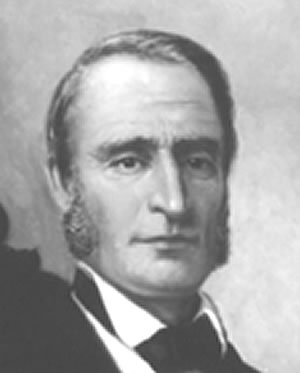
Charles Coffin Harris, minister of finance in the Sandwich Islands, was
described by Clemens as having a "cadaverous undertaker's countenance."
Harris, who was never an undertaker but had a middle name that invoked memories
of undertakers, eventually became one of Clemens's most vilified targets.
Samuel Clemens spent about five months in the Sandwich Islands from March
to July 1866. He sent back twenty-five
letters to the Sacramento Daily Union which were reprinted in newspapers
around the country. Of all the people and characters that he met in the Sandwich
Islands, the one he most vilified in print was an American who had the middle
name of "Coffin." Clemens's dislike of Harris was equal to his dislike
of men who were undertakers and he continually described Harris as having
undertaker traits. Harris was a lawyer born in New Hampshire who had gone
to the Sandwich Islands and became a close adviser to King Kamehameha V. Harris
later served as minister of foreign affairs and as a chief justice of the
Hawaiian Supreme Court. One historian has observed that Harris:
. . . deserved something better than the sneering obloquy heaped upon him
by the American humorist [in the Sacramento Daily Union]. It is true
that Harris had an unfortunate domineering manner, an air of superiority
and condescension that infuriated some people and repelled many others;
but he was a man of considerable natural ability, indefatigable industry,
and unimpeachable personal integrity (Mark Twain's Notebooks & Journals,
Vol. 1, p. 119).
Clemens visited the Hawaiian legislature at work in Honolulu in May. In a
letter dated May 23, 1866 and published in the Daily
Union on June
21, 1866, he vilified Harris in a manner reserved for his most hated enemies:
Minister Harris is six feet high, bony and rather slender, middle-aged;
has long, ungainly arms; stands so straight that he leans back a little;
has small side whiskers; from my distance his eyes seemed blue, and his
teeth looked too regular and too white for an honest man; he has a long
head the wrong way - that is, up and down; and a bogus Roman nose and a
great, long, cadaverous undertaker's countenance, displayed upon which his
ghastly attempts at humorous expressions were as shocking as a facetious
leer on the face of a corpse. He is a native of New Hampshire, but is unworthy
of the name of American. I think, from his manner and language to-day, that
he belongs, body and soul, and boots, to the King of the Sandwich Islands
and the "Lord Bishop of Honolulu." He has no command of language
-- or ideas. His oratory is all show and pretense; he makes considerable
noise and a great to do, and impresses his profoundest incoherencies with
an oppressive solemnity and ponderous windmill gesticulations with his flails.
He raises his hand aloft and looks piercingly at the interpreter and launches
out into a sort of prodigious declamation, thunders upward higher and higher
toward his climax --words, words, awful four-syllable words, given with
a convincing emphasis that almost inspires them with meaning, and just as
you take a sustaining breath and "stand by" for the crash, his
poor little rocket fizzes faintly in the zenith and goes out ignominiously.
The sensation one experiences is the same a miner feels when he puts in
a blast which he thinks will send the whole top of a mountain to the moon,
and after running a quarter of a mile in ten seconds to get out of the way,
is disgusted to hear it make a trifling, dull report, discharge a pipe-full
of smoke, and barely jolt half a bushel of dirt. After one of these incomprehensible
ravings, Mr. Harris bends down and smiles a horrid smile of self-complacency
in the face of the Minister of the Interior -- bends to the other side and
continues it in the face of the Minister of Foreign Affairs; beams it serenely
upon the admiring lobby, and finally confers the remnants of it upon the
unhappy interpreter -- all of which pantomime says as plainly as words could
say it: "Eh? -- but wasn't it an awful shot?" Harris says the
weakest and most insipid things, and then tries by the expression of his
countenance to swindle you into the conviction that they are the most blighting
sarcasms. And in seven years I have never lost my cheerfulness and wanted
to lay me down in some secluded spot and die, and be at rest, until I heard
him try to be funny to-day. If I had had a double-barreled shotgun I would
have blown him into a million fragments.
Clemens resumed his attack on Harris a month later after catching a glimpse
of him at a funeral for a Hawaiian princess. In a letter published July
30, 1866 in the Daily Union he wrote:
Harris was an American once (he was born in Portsmouth, N.
H.), but he is no longer one. He is hoopilimeaai to the King. How do you like
that, Mr. H.? How do you like being attacked in your own native tongue?
[NOTE TO THE READER. - That long native word means -- well, it means Uriah
Heep boiled down -- it means the soul and spirit of obsequiousness. No genuine
American can be other than obedient and respectful toward the Government
he lives under and the flag that protects him, but no such an American can
ever be hoopilimeaai to anybody.]
Clemens returned to San Francisco in late August 1866 while his news reports
from the Sandwich Islands were still appearing in the Sacrament Daily Union.
A notebook entry written shortly after his return refers to Harris as "that
---cking Harris" (Notebooks and Journals, Vol. 1, p. 149).
On October 2 Clemens embarked on a lecture tour around the state of California
which eventually spread to the east coast. The topic of his presentation was
usually announced as "Our Fellow Savages of the Sandwich Islands."
The surviving fragments of Clemens's original notes for his speech indicate
that Harris was a butt of his jokes in that lecture (Letters, Vol. 5,
p. 331). When Clemens lectured in Quincy, Illinois on April 9, 1867, his old
colleague from Nevada Major Dallam, who later committed suicide in the spring
of 1868 with an overdose of laudanum, wrote of Mark Twain's upcoming appearance
in the Quincy Whig. He made no mention of their previous feud that
had occurred shortly after Jennie Clemens's death:
We had a call, yesterday, from an old friend, Mark Twain (Sam
Clemens, Esq.), the California humorist whom we had not seen since we parted
from him on the sunward side of the Sierra Nevadas some three years ago. The
aroma of sage brush does not hang around him still. The gentle "Washoe
Zephyrs," which lifted a loaded quartz wagon with remarkable ease, have
left no rough traces upon his good-humored face. The many feet which he once
owned in Washoe, "wild cat" claims, out of which he expected to
realize untold wealth, have long since been "sold for assessments,"
and yet he can still laugh, and make others laugh. He is, indeed, "a
fellow of infinite jest" -- as our friends may learn to their entire
satisfaction by attending a lecture which he proposes to give in this city
on Tuesday next.
Mark's funny stories and quaint sayings are not so well known here as in
California, where they have secured for him a reputation not surpassed by
any humorist that ever attempted to amuse that people, who are, perhaps,
more critical than any other community in the Union.
His wit and his style are peculiarly his own -- original, racy and irresistible.
The first time we heard Mark was at Carson City, the capital of the State
of Nevada, on the assembling of the Territorial Legislature in the winter
of 1863-4. Hon. James W. Nye (now U.S. Senator) was then Governor of the
Territory. After the delivery of the inaugural to the "assembled wisdom"
of Silverland, Mark Twain took the speaker's stand and delivered his inaugural
as Governor of the Territory chosen by the "Third House," to a
very large audience of gentlemen and about all the ladies then in Carson
City. It was received with great applause and roars of laughter. Mark gave
the Governor some hard hits, in a sly way, but no one enjoyed the fun more
than rotund and rubicund Nye.
The lovers of genial humor will find nothing coarse or vulgar in Mark Twain's
lecture. He also sometimes (by mistake, he says) indulges in beautiful flights
of fancy and eloquence. But of his talent as a lecturer, our citizens will
soon have an opportunity of judging, and we bespeak for him, in advance,
a fair audience (online
at "Mark Twain in His Times").
Clemens extended his lecture tour on the Sandwich Islands into May 1867,
ending at Irving Hall in New York City on May 15. He was in Washington, D.C.
and corresponding with the San Francisco Alta California when he again
encountered Charles Coffin Harris. In a letter from Washington dated May 26,
1867 and published in the Alta
on July 21, 1867 he alerted his readers to the fact that:
His Excellency C. C. Harris, of Honolulu -- is to visit Washington
as a sort of Envoy Extraordinary to engineer a Reciprocity treaty between
the Hawaiian Government and ours. I have got to call on Harris. I owe it to
my country to do it. I must conjure Harris by the new dignity that has been
conferred upon him of the Grand Cross of the Legion of something or other;
and by this other dignity of being by far the most extraordinary Envoy Extraordinary
that ever was created by any Government history hath mentioned; and by the
love and the respect he once bore this land of his nativity before he was
born again as a royalty-worshipping Kanaka, not to lay his unsanctified hand
upon anything here that he can't carry. It is his unhappy instinct to gobble,
gobble, gobble -- gobble up and carry off. Whether it be to gouge native (chiefs,
or seek distinction on high as an Elder in Bishop Staley's Church and pass
around the hat, (oh, blind and deluded congregation that would trust him with
it ) or grab all the heavy offices, from Minister of Finance down to Attorney-General-by-brevet,
and try to run the whole Hawaiian Government by himself, his instinct is the
same, and it is always to gobble. So I must warn him.
And he must not swell around Washington and make eloquent speeches that
seem to be splendid flights of oratory, but won't stand a fire-assay for
sense, and won't wash for coherence, either, because we have got people
in Congress who are just as good as he is at that, and so he won't attract
any attention.
I must tell him to mind his own business -- to mind his reciprocity treaty,
and keep his hands off the things. If he does his work just exactly as he
wants to do it, and as only his tireless industry and his marvellous cheek
can do it, he can succeed in clinching a treaty that will make American
interests very sick in the Sandwich Islands. The Herald's Honolulu
correspondence of this morning rather warns Congress to look out for Harris,
and I am inclined to think the warning was very well put in, and would find
an echo from every American in the Islands. I still continue in my set opinion
that Harris won't do.
Shortly after his latest attack on Harris, Clemens landed another assignment
for the Alta -- one that would take him abroad.
_____
Mark Twain Tours the Holy Land - 1867
Working as a correspondent for the San Francisco Alta California,
Clemens set sail aboard the Quaker City for a tour of Europe and the
Holy Land in June 1867. The tour extended into November 1867 and he sent fifty
travel letters back to the Alta which were reprinted in newspapers
across the United States. The letters would eventually become the backbone
of his first best seller The Innocents Abroad which would launch his
career as a nationally known author.
Clemens could not long shake his memories of and resentment of undertakers
and when the opportunity arose to lampoon them in print, he did not fail to
do so. Writing from Genoa, Italy on July 16, 1867 he related his impressions
of seedy Italians who followed his group of tourists waiting for them to throw
away their cigar stubs:
You cannot throw an old cigar "stub" down anywhere, but some
seedy rascal will pounce upon it on the instant. I like to smoke a good
deal, but it wounds my sensibilities to see one of these stub-hunters watching
me out of the corners of his hungry eyes and calculating how long my cigar
is going to last. It reminded me, too, painfully of that San Francisco undertaker
who used to go to sick-beds with his watch in his hand and time the corpse
(McKeithan, p. 43).
Following his description of the cigar stub hunters, he began a description
of the palaces of Genoa his group toured and again the image of the undertaker
was invoked:
We have visited several of the palaces -- immense thick-walled piles, with
great stone staircases ... and portraits of heads of the family, in plumed
helmets and gallant coats of mail, and patrician ladies, in stunning costumes
of centuries ago. ... and so all the grand empty saloons, with their resounding
pavements, their grim pictures of dead ancestors, and tattered banners with
the dust of bygone centuries upon them, seemed to brood solemnly of death
and the grave, and our spirits ebbed away, and our cheerfulness passed from
us. ... There was always an undertaker-looking villain of a servant along,
too, who handed us a programme, pointed to the picture that began the list
of the saloon he was in, and then stood stiff and stark and unsmiling in
his petrified livery till we were ready to move on to the next chamber,
and then he marched sadly ahead and took up another malignantly respectful
position as before. I took up so much time praying that the roof would fall
in on these dispiriting flunkeys that I never had any left to bestow upon
palace and pictures (McKeithan, pp. 43-4.)
Clemens would later slightly revise and use the two passages in Chapter 27
of The Innocents Abroad. The illustrator for the first edition of the
book chose to draw the "undertaker-looking" servant for the passage
describing Genoa palaces.
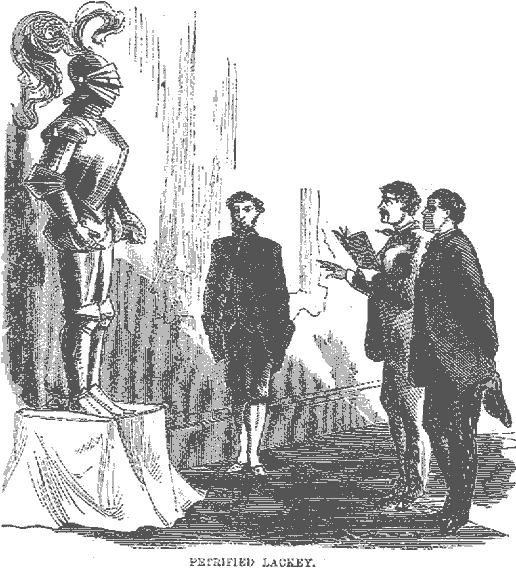
Illustration
from first edition of
THE INNOCENTS ABROAD labeled"Petrified
Lackey."
However the word "lackey" was never used in Twain's actual text.
The tour of the Holy Land ended in November 1867 and Clemens
returned to Washington, D.C. where he continued to contribute letters to the
Alta California.
_____
Mark Twain Encounters Charles Coffin Harris Again
Harris is here yet. Harris is Lord High Minister of Finance to the King
of the Sandwich Islands when he is at home and it don't rain. But he is
"His Royal Hawaiian Majesty's Envoy to the United States" now,
and no man is sorrier than I am that his wages are stopped for the present.
I met him and conversed with him at the house of a mutual friend a night
or two ago, and that is how I happen to know how to spell his title all
the way through without breaking my neck over any of the corduroy syllables.
I never saw Harris so pleasant and companionable before. He is really
very passable company, until he tries to be funny, and then Harris is
ghastly. He smiles as if he had his foot in a steel trap and did not want
anybody to know it. I can forgive that person anything but his jokes --
but those, never. While Harris continues to joke there will be a malignant
animosity between us that no power can mollify.
Harris' business here is to get our Government to remove our man-of-war
from the Sandwich Island waters. To give this enterprising devil his due,
he has done everything he possibly could do to accomplish his mission,
and it was ungraceful in the King to stop his salary. He could not accomplish
it and I suppose nobody could. It is a good place out there for a man-of-war;
she is not doing any harm; she is not going to do any harm; and until
a fair, reasonable reason is given for banishing her, she will remain.
In placing her there, no offence whatever was meant to the King or the
country, any more than we mean to offend the Sultan when we anchor a frigate
in the harbor of Smyrna.
I have missed Harris during the last day or two. I wonder what is become
of him. I grieve to see a man fail in an honest endeavor; and now that
his King has turned against him, I even wish that Harris could succeed
in his mission.
This softening attitude toward Harris was short-lived. Several
years later he would again vilify him in print.
While working as a reporter in Washington, D.C. in 1868, Clemens also contributed
six letters to the Chicago Republican. In two of the letters written
in February 1868 he again invoked the image of undertakers into his descriptions.
It had been four years to the month since Jennie Clemens had died back in
Carson City, Nevada.
Writing from Washington on Valentine's Day in a letter
published on February 19 in the Republican, Clemens humorously
described Valentines he received:
I usually receive notes with pictures in them; pictures of deformed shoemakers;
pictures of distorted blacksmiths; pictures of cadaverous undertakers; pictures
of reporters taking items at a fire and stealing clothes; and oftenest,
pictures of asses, with ears longer than necessary, writing letters to newspapers.
I refer to the reception given by the "Illinois State Association,"
yesterday evening. Or, rather, it was more a "reunion," with considerable
"at home" in it than the funereal high comedy they call a "reception
in Washington." ...
I only met one icicle in the whole party. He shook hands without cordiality,
and bowed with altogether too much condescension. I said, with a vivacity
that considerably oversized the importance of the remark:
"It has been a very fine day, sir."
Then this monument, this undertaker, this galvanized graveyard said:
"Sir, what the weather may be, or what the weather may not be, concerns
not me, when my country is in danger." ...
I think this old sepulchre was a member of Congress, but I did not catch
his name distinctly. But why do such people go to social gatherings, and
practice their execrable speeches on unoffending strangers? Why do they
go around saving the country all the time, and snubbing the weather? Why
do not they do like Garret Davis, and persecute Congress, which is paid
to be persecuted? These harmless lunatics only distress the guests at an
evening party, without absolutely scaring them. I would be ashamed to act
so poor a part as that. If I had to be a lunatic, I do think I would have
self-respect enough to be a dangerous one. I hate that solemn-visaged body-snatcher
now, and if he is a Congressman I shall always try to find out all the mean
things I can that other people do, and put them in print and attribute them
to him. I think that will make him wince.
One of the ultimate insults Clemens was incorporating was the description
of someone as an "undertaker" or "body-snatcher."
_____
The Buffalo Express - 1869-70
In January 1868 Elisha Bliss of the American Publishing Company made arrangements
with Clemens to publish a book based on the Quaker City excursion through
Europe and the Holy Land. Clemens
worked on his manuscript for a few months while living in Washington.
In March 1868 he left Washington to return to San Francisco to obtain from
the Alta California the rights to reuse his Alta newspaper travel
letters describing the trip. Clemens completed his manuscript in June 1868
and several months later turned his attention to correcting proofs of the
book with his new wife-to-be Olivia "Livy" Langdon of Elmira, New
York, a sister of one of his Quaker City traveling companions. The
Innocents Abroad was published in July 1869 and widely praised by critics.
In August 1869 Clemens purchased one-third interest in the Buffalo
(New York) Express newspaper with money borrowed from Livy's father
Jervis Langdon. Clemens wrote numerous essays and editorials for the Express.
On of his earliest contributions was "A Day at Niagara" published
in the Express on August 21, 1869. This humorous and satiric sketch
of a visit to Niagara Falls concludes with Mark Twain getting tossed in the
Falls. A greedy coroner sitting on the bank declines to rescue him.
| The sketch retitled "A Visit to Niagara" was included in the
collection Sketches New and Old published in 1875 and featured
an illustration of the undertaker sitting on the bank waiting for Mark
Twain to drown. |
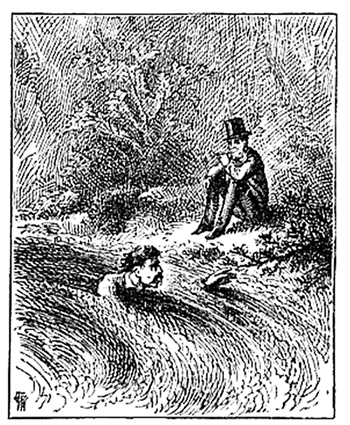
Illustration
from first edition of SKETCHES NEW AND OLD |
On September 4, 1869 Clemens published "Journalism in Tennessee"
in the Express. This humorous parody of frontier journalism features
subjects of news reports settling their complaints with the editor with weapons.
One such complainant, Colonel Blatherskite Tecumseh, who is mortally wounded
after a shoot-out remarks with fine humor, "that he would have to say
good morning now, as he had business up town. He then inquired the way to
the undertaker's and left" (Sketches New and Old, p. 47). Although
the sketch is set in Tennessee, Clemens was drawing on his own experiences
from his newspaper days in Virginia City.
On January 22, 1870 Clemens contributed an essay for the Express on
desperadoes, killers and outlaws of Nevada and California and how one in particular,
Jack Williams, contributed to the welfare of the local undertaker.
He killed a good many men. He was a kind-hearted man, and gave all his
custom to a poor undertaker who was trying to get along. But by and bye
some body poked a double barrelled shot gun through a crack while Williams
was sitting at breakfast, and riddled him at such a rate that there was
hardly enough of him left to hold an inquest on -- and then the poor unfortunate
undertaker's best friend was gone, and he had to take in his sign. Thus
he was stricken in the midst of his prosperity and his happiness -- for
he was just on the point of getting married when Jack Williams was taken
away from him, and of course he had to give it up then (Mark Twain at
the Buffalo Express, p. 143).
Clemens once again emphasizes the prosperity undertakers enjoy at the hands
of tragedy.
According to Thomas J. Reigstad in his Scribblin' for Livin' (2013),
Mark Twain published numerous commentary in the pages of the Buffalo Express:
. . .singling out the avarice of coroners who constantly drummed
up business. One of Twain's favorite targets in the Express was Dr.
John J. Burke, a coroner in Buffalo. Twain's mock feud with Burke was particularly
intense in the spring of 1870 when Twain referred to Burke as "our pompous
and officious coroner" and complained about Burke's "personal abuse
of the City Editor of the Express" (City and Vicinity, BME, May
3, 1870). In the April 30 Express, Twain took aim at his greed: "The
zeal of Dr. Burke outruns his wit." And in March, Twain also criticized
the coroner profession in the Express (City and Vicinity, March 23,
1870). (Scribblin' for a Livin', p. 294).
The
Galaxy - 1870
After a long courtship and year-long engagement Samuel Clemens and Olivia
Langdon were married February 2, 1870 and settled in Buffalo. His new book,
The Innocents Abroad, proved to be a success and he received an invitation
to write for the monthly magazine The Galaxy. Clemens had previously
published two articles in The Galaxy in February and May 1868 at the
time he was living in Washington, D. C. Under his new arrangement, Clemens's
first contribution appeared in The Galaxy in May 1870 under the heading
"Mark Twain's Memorandum."
The year 1870 proved to be a year of deaths for the newly married couple.
In the spring Livy's father's health began a rapid decline as he battled stomach
cancer. Jervis Langdon died on August 6, 1870. The following month Livy's
friend Emma Nye died in their Buffalo home of typhoid fever. Livy, suffering
from stress over the loss of both her father and her girl friend delivered
the couple's first child, a son, prematurely. For a while both Livy and her
newborn were extremely ill. With death hovering over the Clemens household,
it is not surprising to find Mark Twain's contributions to The Galaxy
containing references to undertakers.
In the June
1870 Galaxy a short untitled item discussed a Civil War widow's
surprise at the high cost of having her husband embalmed. Written in a humorous,
dark comedy tone, the widow expects an embalming to cost a few dollars and
is surprised to see the charge of seventy-five. The sketch was later reprinted
in Sketches New and Old in 1875 under the title "The Widow's Protest."
In the November
1870 Galaxy, a few months after Jervis Langdon's death, Clemens
published an item titled "A Reminiscence of the Back Settlements."
The sketch features a mock monologue by an undertaker who is chatty and cheerful
regarding the wishes of his most recent customer. The sketch concludes with
the statement, "a healthy and wholesome cheerfulness is not necessarily
impossible to any occupation. The lesson is likely to be lasting, for it will
take many months to obliterate the memory of the remarks and circumstances
that impressed it." This sketch was also reprinted in Sketches New
and Old in 1875 and retitled "The Undertaker's Chat."
The December
1870 Galaxy featured Twain's sketch "Running for Governor"
and included a number of insults Mark Twain received when he imagined himself
running for governor of the state of New York. Among these was "Twain,
the Body-Snatcher."
On December 20, 1870 Clemens replied to a letter from Albert Francis Judd
from the Sandwich Islands. Judd was a Hawaiian missionary and statesman who
later became attorney general of the islands. Judd's letter brought to Clemens's
mind memories of Charles Coffin Harris. Clemens replied to Judd who had recently
traveled to the United States:
I do wish you had spent a day or two with us in Buffalo, & I
beg that you will when you come again. I love to see people from
the Islands notwithstanding I conducted myself so badly there & left
behind me so unenviable a name. But then you know they honor Harris there,
& so while that continues the preferable distinction is to stand dishonored,
maybe. I never stole anything in the Islands -- and ah, me, I wish Harris
could say as much! (Letters, Vol. 4, p. 278).
There is no historical evidence to suggest Charles Coffin Harris ever stole
from the people of Hawaii or was dishonest.
_____
Roughing It - 1871-72
Following the success of his book The Innocents Abroad,
Clemens turned his attention almost immediately to another book. Initially
he considered writing about his trip to the Sandwich Islands and later decided
to expand the focus to include his time in Nevada and the west. In March 1870
he asked Orion to send his journal from their stagecoach journey to Nevada
as well as other newspaper clippings and scrapbook items. Clemens negotiated
another contract with Elisha Bliss of American Publishing Company in July
1870 for the book that would eventually be titled Roughing It. Clemens's
intent was to have the manuscript finished by the end of 1870. However, the
death of Jervis Langdon in August, the death of Emma Nye in September, Livy's
difficulty with the birth of their first child, and writing commitments for
the Buffalo Express and Galaxy hindered his ability to concentrate
on writing his book manuscript. He was unable to submit any manuscript until
March 1871. That same month Clemens decided to terminate his association with
both the Buffalo Express and The Galaxy in order to focus on
his career as a writer of books.
Mark
Twain's last "Memoranda" for The Galaxy appeared in April
1871. In it he told his readers:
I have written for The Galaxy a year. For the last eight months,
with hardly an interval, I have had for my fellows and comrades, night and
day, doctors and watchers of the sick! During these eight months death has
taken two members of my home circle and malignantly threatened two others.
All this I have experienced, yet all the time been under contract to furnish
"humorous" matter once a month for this magazine. I am speaking
the exact truth in the above details. Please to put yourself in my place
and contemplate the grisly grotesqueness of the situation. I think that
some of the "humor" I have written during this period could have
been injected into a funeral sermon without disturbing the solemnity of
the occasion.
The Clemenses relocated to Livy's hometown of Elmira, New York where he was
able to complete his manuscript for Roughing It in August. In October
1871 the couple moved to Hartford, Connecticut -- the hometown of American
Publishing Company. In mid-October 1871 Clemens launched another
lecture tour through the Northwest and Midwest that would extend into February
1872. In December he started incorporating excerpts from his upcoming
book in his lectures. His lecture tour provided needed income as well as advance
publicity for his new book.
Roughing It was officially released in the United States on February
19, 1872. The book is not pure autobiography nor a travel volume. Clemens
took many liberties with the truth, invented episodes, embellished events
and omitted many important events in his life while in Nevada. Missing entirely
from the book is any mention of the death of Jennie Clemens. However, the
topics of funerals and undertakers were included. He introduced chapter 47
of his book with the passage:
Somebody has said that in order to know a community, one must observe the
style of its funerals and know what manner of men they bury with most ceremony.
I cannot say which class we buried with most eclat in our "flush times,"
the distinguished public benefactor or the distinguished rough -- possibly
the two chief grades or grand divisions of society honored their illustrious
dead about equally; and hence, no doubt, the philosopher I have quoted from
would have needed to see two representative funerals in Virginia before
forming his estimate of the people (Roughing It, p. 308).
Chapter 47 continues in a comic vein emphasizing the communication difficulties
that occur when Scotty Briggs, a Virginia City "stalwart rough"
tries to arrange a funeral with a new minister described as a "fledgling
from an eastern theological seminary." Both characters have difficulty
understanding the jargon and slang of the other.
Chapter 53 of Roughing It, features "The Story of the Old Ram"
-- a story Clemens also used in his public lectures -- a story about an old
miner named Jim Blaine who begins a tale about his grandfather's old ram but
never reaches a conclusion because he continually gets sidetracked onto other
topics. Among the other topics is a story of a vulture-like undertaker:
Miss Jacops was the coffin-peddler's wife - a ratty old buzzard, he was,
that used to go roosting around where people was sick, waiting for 'em;
and there that old rip would sit all day, in the shade, on a coffin that
he judged would fit the can'idate; and if it was a slow customer and kind
of uncertain, he'd fetch his rations and a blanket along and sleep in the
coffin nights (Roughing It, p. 364).
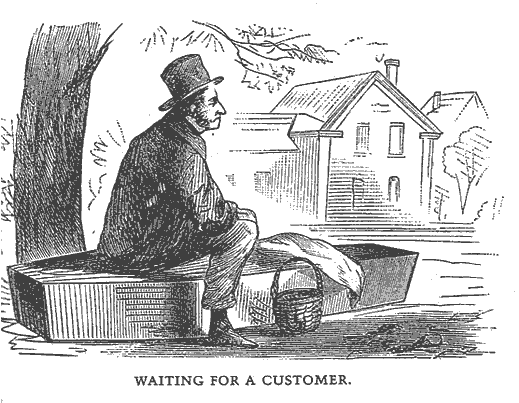
Illustration
of an undertaker from first edition of ROUGHING IT.
Langdon Clemens, Samuel and Livy's first born child died June
2, 1872 in Hartford, just a few months after Roughing It was published.
On June 18 Clemens sent a letter to Louise Chandler Moulton who had written
a positive review of Roughing It for the New York Tribune on
June 10. He also thanked her for an expression of sympathy over his son's
death:
We did feel such a jubilant pride in our boy. You know how honest is the
conviction that the child that is gone was the one only spirit that was
perfect. When we shall feel "reconciled," God only can tell. To
us it seems a far away time, indeed (Letters, Volume 5, pp. 108-09).
Sharing in the family's grief were Orion and Mollie Clemens
who came to visit and comfort the family in the days after Langdon's death.
_____
Charles Coffin Harris, Again - 1873
On December 28, 1872 Whitelaw Reid, editor and proprietor of
the New York Tribune, invited Clemens to contribute a few articles
to his newspaper on any topic of interest with a promise to pay enough to
make it worth his while. The death of Hawaiian King Kamehameha V had recently
been announced in the New York newspapers and his obituary had been published
in the Tribune on January 2, 1873. Clemens sent the Tribune
two articles on the Sandwich Islands he wrote on January 3 and January 6,
1873. In the second article which was published in the Tribune on January
9, 1873 Clemens again took up his vendetta against Charles Coffin Harris and
among the many faults he gave to Harris was again his undertaker countenance:
The "Royal Ministers" are natural curiosities. They are white
men of various nationalities, who have wandered thither in times gone by.
I will give you a specimen -- but not the most favorable. Harris, for instance.
Harris is an American -- a long-legged, vain, light-weight village lawyer
from New-Hampshire. If he had brains in proportion to his legs, he would
make Solomon seem a failure; if his modesty equaled his ignorance, he would
make a violet seem stuck-up; if his learning equaled his vanity, he would
make Avon Humboldt seem as unlettered as the backside of a tombstone; if
his statue were proportioned to his conscience, he would be a gem for the
microscope; if his ideas were as large as his words, it would take a man
three months to walk around one of them; if an audience were to contract
to listen as long as he would talk, that audience would die of old age;
& if he were to talk until he said something, he would still be on his
hind legs when the last trump sounded. And he would have cheek enough to
wait till the disturbance was over, & go on again.
Such is (or was) His Excellency Mr. Harris, his late Majesty's Minister
of This, That, & The Other -- for he was a little of everything; &
particularly & always he was the King's most obedient humble servant
& loving worshiper, & his chief champion & mouthpiece in the
parliamentary branch of ministers. And when a question came up (it did n't
make any difference what it was), how he would rise up & saw the air
with his bony flails, & storm & cavort & hurl sounding emptiness
which he thought was eloquence, & discharge bile which he fancied was
satire, & issue dreary rubbish which he took for humor, & accompany
it with contortions of his undertaker countenance which he believed to be
comic expression!
He began in the islands as a little, obscure lawyer, & rose (?) to
be such a many-sided official grandee t hat sarcastic folk dubbed him, "the
wheels of the Government." He became a great man in a pigmy land --
he was of the caliber that other countries construct constables & coroners
of. I do not wish to seem prejudiced against Harris, & I hope that nothing
I have said will convey such an impression I must be an honest historian,
& to do this in the present case I have to reveal the fact that this
stately figure, which looks so like a Washington monument in the distance,
is nothing but a thirty-dollar windmill when you get close to him.
Harris loves to proclaim that he is no longer an American, & is proud
of it; that he is a Hawaiian through & through, & is proud of that
too; & that he is a willing subject & servant of his lord &
master, the King, & is proud & grateful that it is so (Letters,
Volume 5, pp. 570-71).
Shortly after writing his Tribune contributions, Clemens
took up another project -- his first novel.
_____
The Gilded Age: A Tale of To-Day - 1873
Clemens's first novel The Gilded Age was written in collaboration
with his Hartford neighbor Charles Dudley Warner, editor of the Hartford Courant
newspaper. The idea of writing a novel together originated around the dinner
table in early 1873 when Livy Clemens and Mrs. Warner challenged their husbands
to write "better" novel than the ones they had been recently criticizing.
Clemens and Warner accepted their wives' challenge and completed the project
in April 1873. Most of the chapters were written by primarily either Clemens
or Warner, but both contributed ideas and suggestions to almost every chapter
as they shared their work. The final result was a novel that satirized America's
obsession with the pursuit of wealth and skewered big business and politics.
Chapter 43 of The Gilded Age features the character Philip
Sterling, a bright and honest Yale graduate experiencing Washington, D.C.:
There was a little newspaper editor from Phil's native town, the assistant
on a Peddletonian weekly, who made his little annual joke about the "first
egg laid on our table," and who was the menial of every tradesman in
the village and under bonds to him for frequent "puffs," except
the undertaker, about whose employment he was recklessly facetious. In Washington
he was an important man, correspondent, and clerk of two house committees,
a "worker" in politics, and a confident critic of every woman
and every man in Washington. He would be a consul, no doubt, by and by,
at some foreign port, of the language of which he was ignorant; though if
ignorance of language were a qualification he might have been a consul at
home. His easy familiarity with great men was beautiful to see, and when
Philip learned what a tremendous underground influence this little ignoramus
had, he no longer wondered at the queer appointments and the queerer legislation
(The Gilded Age, p. 398-99).
Scholars believe that Warner wrote most of Chapter 43. However,
the reference in the above paragraph to a small town newspaper editor who is
obligated to "puff" all the trademen except the undertaker about whom
he could be "recklessly facetious" is reminiscent of Clemens's experiences
in Carson City and California. The criticism of that same editor as ignorant
enough to be a consul is also similar in tone to Clemens's Tribune letters
stating that Hawaiian Minister Charles Coffin Harris was "of the caliber
that other countries construct constables & coroners." In all likelihood,
this particular paragraph benefited in part, if not in total, from Clemens's
input.
_____
King David Kalakaua Defends Harris and Attempts to Explain
Mark Twain - 1874
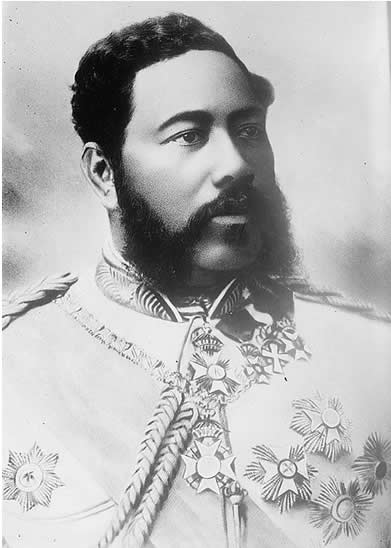
King David
Kalakaua of Hawaii governed from 1874 - 1891.
Photo from the Library of Congress Prints and Photographs Division.
Hawaiian King Kamehameha V was succeeded by William Lunalilo
in 1873 who held office for shortly over a year before his death in February
1874. David Kalakaua succeeded William Lunalilo King David Kalakaua appointed
Charles Coffin Harris as First Associate Justice of the Hawaiian courts and
later promoted him to Chief Justice and Chancellor -- a testament to the high
regard Harris held with the ruling dynasty of Hawaii in spite of Clemens's
attempts to ridicule him. It was a position Harris would hold until his death
in 1881.
Samuel Clemens first met David Kalakaua in the Sandwich Islands
in April 1866 when Kalakaua was serving as Grand Chamberlain under King Kamehameha
V. Shortly after meeting him, Clemens described him in a letter to his mother
and sister, "although darker than a mulatto, he has an excellent English
education & in manners is an accomplished gentleman" (Letters,
Volume 1, p. 394).
After Kalakaua succeeded to the Hawaiian throne in February
1874 he made a tour of the United States in the fall of that year accompanied
by all the publicity usually given to royal dignitaries. Kalakaua visited
in New York in late December 1874. Clemens was in New York on December 23
for the 100th
performance of "The Gilded Age," a play based on a book of the
same title he had written with Charles Dudley Warner. Clemens visited with
Kalakaua at the Windsor Hotel in New York on Christmas Eve 1874. That same
day the New York Tribune published an interview with Kalakaua "The
King's Impressions of America" on the front page of the paper. Kalakaua
responded to a question asking his opinion of Mark Twain's portrayal of the
islands:
The King was asked whether the pen-portrait of Minister Harris, a member
of the Cabinet of a former King, was true to life. The King laughed, and
replied that Mr. Harris was a tall, angular, rather awkward, but good-hearted,
well-meaning man. He knew of no personal feeling between Mark Twain and
Mr. Harris, and judged it was the humorist's love of burlesque which had
led him to seize upon the figure of Mr. Harris as a good subject for sport
(Letters, Volume 6, p. 331).
Kalakaua attended a performance of "The Gilded Age" a few days
later. Although Clemens was not in attendance, he issued an invitation for
the King to visit him in Hartford on New Year's Eve. However, other engagements
prevented the King's visit to Hartford. And no further articles deriding Charles
Coffin Harris appeared over Mark Twain's signature.
A Story Mark Twain Never Published: "The Undertaker's Tale"
- 1877
For almost the first twenty years of their marriage, Sam and
Livy and their family usually spent their summers away from Hartford and at
Quarry Farm in Elmira, New York, at the home of Livy's adopted sister Susan
Crane. In 1874 Susan Crane built Sam an octagonal study located on the peak
of a hill almost a hundred yards from the main farm house. The study offered
Clemens the peace and tranquility needed for writing -- necessities for an
author who supported his family with his pen. (The bulk of his first major
novel The Adventures of Tom Sawyer was written there the first summer
the study was built. Based on a number of Sam Clemens's childhood experiences
in Hannibal, Missouri, Tom Sawyer includes a grave-robbing scene but
there is no mention of undertakers in the novel.)
Clemens's method of work while in Elmira was to retreat to his
study, write throughout the day, and come down in the evening to read to the
family the results of each day's labor. According to his biographer Albert
Bigelow Paine:
Once, when for a day he put aside other matters to record
a young undertaker’s love-affair, and brought down the result in the
evening, fairly bubbling with the joy of it, he met with a surprise. The tale
was a ghastly burlesque, its humor of the most disheartening, unsavory sort.
No one spoke during the reading, nobody laughed: The air was thick with disapproval.
His voice lagged and faltered toward the end. When he finished there was heavy
silence. Mrs. Clemens was the only one who could speak:
“Youth, let’s walk a little,” she said.
The “Undertaker’s Love Story” is still among the manuscripts
of that period, but it is unlikely that it will ever see the light of print
(Paine, pp. 508 - 09).
However, Clemens may have continued to work on the story. After the family
returned to Hartford in the fall, Clemens wrote to his colleague William Dean
Howells on October 15, 1877 and noted:
P.S. When you come, remind me to show you my "Undertaker's Tale --
& tell me what is the trouble with it. (Mark Twain - Howells Letters,
Volume 1, p. 206).
"The Undertaker's Tale" which was misidentified by Paine as "Undertaker's
Love Story" is a manuscript of 36 pages. The story revolves around an
unnamed narrator; an undertaker named Mr. Cadaver; his daughter Grace; Grace's
fiancé Joseph who was a sexton and gravedigger; and Marlow, the town
miser. After being rescued from starvation by the Cadaver family the narrator
goes to work in the undertaker's establishment and relates the story of how
Mr. Cadaver mortgaged the family's home to Marlow in order to buy Grace and
her fiancé a cemetery. The narrator relates how the Cadaver family's
fortunes worsen when there are no deaths in the village that spring. When
Marlow threatens to foreclose on the loan, Mr. Cadaver presents him a list
of assets -- names of the ailing residents of the village. When the narrator
visits residents of the city he is distressed to see they are feeling well.
On the brink of a family financial disaster, news is finally received that
cholera has arrived in its most malignant form. With the cholera came death,
prosperity and happiness for the undertaker's family.
"The Undertaker's Tale" is written in a satirical vein but the
story also features a plot device that Clemens had used previously in The
Innocents Abroad (1869) and would use again in "The War-Prayer"
(1905) -- for every action there is an equal and opposite reaction. In The
Innocents Abroad, he wrote about the Holy Land excursionists who prayed
for fair winds:
There they are, down there every night at eight bells, praying for fair
winds -- when they know as well as I do that this is the only ship going
east this time of the year, but there's a thousand coming west -- what's
a fair wind for us is a head wind to them --the Almighty's blowing a fair
wind for a thousand vessels, and this tribe wants him to turn it clear around
so as to accommodate one, and she a steamship at that! It ain't good
sense, it ain't good reason, it ain't good Christianity, it ain't common
human charity (The Innocents Abroad, p. 46).
"The Undertaker's Tale" was not published in Clemens's lifetime.
Livy's distaste for the story and Howells's inability to help him fix it probably
resulted in that decision. Clemens, no doubt, discussed the story with his
biographer Paine and related the delight he took in writing it. The story
was published in a small run of 50 copies titled Twenty-Two Easy Pieces
By Mark Twain for the Bancroft Library by University of California Press
in 2001.
_____
A Tramp Abroad - 1880
From April 1878 to August 1879 the Samuel Clemens family traveled
throughout Europe. Sam gathered information, impressions, and experiences
he would incorporate in another travel book A Tramp Abroad. After returning
home in September he worked on the manuscript which he completed in January
1880. The book was issued by American Publishing Company in March. The book
contains a reference to the role of undertakers in the art of French dueling
as well as several stinging descriptions related to people and scenery that
reminded Mark Twain of undertakers.
In Chapter 8 the narrator describes his mock participation in
a French duel and the honored place of undertakers:
"...I have had a good deal to do with duels on the Pacific coast,
but I see now that they were crude affairs. A hearse, -- sho! we used to
leave the elected lying around loose, and let anybody cord them up and cart
them off that wanted to. Have you anything further to suggest?"
"Nothing, except that the head undertakers shall ride together, as
is usual. The subordinates and mutes will go on foot, as is also usual.
I will see you at eight o'clock in the morning, and we will then arrange
the order of the procession. I have the honor to bid you a good day."
...
At half past nine in the morning the procession approached the field of
Plessis-Piquet in the following order: first came our carriage, -- nobody
in it but M. Gambetta and myself; then a carriage containing M. Fourtou
and his second; then a carriage containing two poet-orators who did not
believe in God, and these had Ms. funeral orations projecting from their
breast pockets; then a carriage containing the head surgeons and their cases
of instruments; then eight private carriages containing a coroner; then
the two hearses; then a carriage containing the head undertakers; then a
train of assistants and mutes on foot; and after these came plodding through
the fog a long procession of camp followers, police, and citizens generally.
It was a noble turnout, and would have made a fine display if we had had
thinner weather (A Tramp Abroad, p. 76, 79).
In Chapter 12 the narrator describes an unscrupulous head waiter:
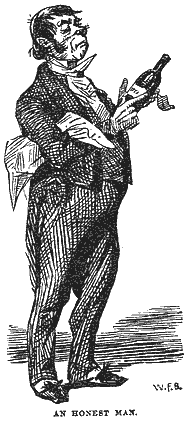
Illustration
from first edition of A TRAMP ABROAD |
Mr. X. had ordered the dinner, and when the wine came
on, he picked up a bottle, glanced at the label, and then turned to
the grave, the melancholy, the sepulchral head waiter and said it was
not the sort of wine he had asked for. The head waiter picked up the
bottle, cast his undertaker-eye on it and said --
"It is true; I beg pardon." Then he turned on
his subordinate and calmly said, "Bring another label."
At the same time he slid the present label off with his
hand and laid it aside; it had been newly put on, its paste was still
wet. When the new label came, he put it on; our French wine being now
turned into German wine, according to desire, the head waiter went blandly
about his other duties, as if the working of this sort of miracle was
a common and easy thing to him (A Tramp Abroad, pp. 111 - 12).
|
In Chapter 31 the narrator describes the charm of quaint Swiss
chalets:
Set such a house against the fresh green of the hillside,
and it looks ever so cosy and inviting and picturesque, and is a decidedly
graceful addition to the landscape.
One does not find out what a hold the chalet has taken upon
him, until he presently comes upon a new house, -- a house which is aping
the town fashions of Germany and France, a prim, hideous, straight-up-and-down
thing, plastered all over on the outside to look like stone, and altogether
so stiff, and formal, and ugly, and forbidding, and so out of tune with the
gracious landscape, and so deaf and dumb and dead to the poetry of its surroundings,
that it suggests an undertaker at a picnic, a corpse at a wedding, a puritan
in Paradise (A Tramp Abroad, p. 324).
In Chapter 47 the narrator describes encountering a large Swiss woman who annoys
passengers on a train trip to Turin by propping her feet on their seats and
claims she has a physical ailment which causes agony when she puts her feet
on the floor.
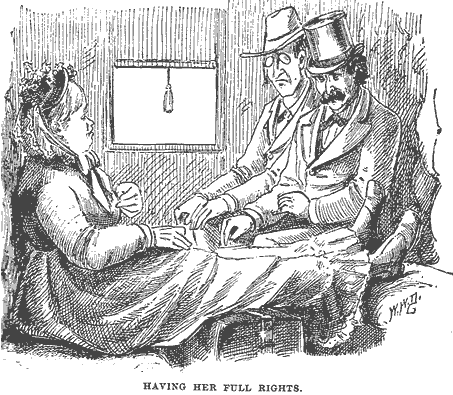
Our compartment was full. A ponderous tow-headed Swiss woman, who put on
many fine-lady airs, but was evidently more used to washing linen than wearing
it, sat in a corner seat and put her legs across into the opposite one, propping
them intermediately with her up-ended valise. In the seat thus pirated, sat
two Americans, greatly incommoded by that woman's majestic coffin-clad feet.
...
She simply sobbed and snuffled in a subdued but wholly unappeasable way for
two long hours, meantime crowding the man more than ever with her undertaker-furniture
and paying no sort of attention to his frequent and humble little efforts
to do something for her comfort. Then the train halted at the Italian line
and she hopped up and marched out of the car with as firm a leg as any washerwoman
of all her tribe! And how sick I was, to see how she had fooled me.
Undertakers and all things associated with the trade continued to furnish Mark
Twain with ideas for description and metaphor. (Large shoes that reminded him
of coffins had been the topic of at least two earlier items: "City
Marshall Perry," Territorial Enterprise, March 3, 1863 written
before Jennie's death and a lesser known sketch in the New York Sunday Mercury
titled "A
Curtain Lecture Concerning Skating" published March 17, 1867.)
"On the Decay of the Art of Lying" - April 1880
In February 1873 Sam Clemens was elected to membership in Hartford's
Monday Evening Club, an elite group of Hartford's most prominent men. Membership
was limited to twenty men who met every other week between October to May
to discuss literary papers written by fellow members. On April 5, 1880 Clemens
hosted the meeting at his home. He sent announcements
stating that the subject of his paper would be a discussion titled "On
the Decay of the Art of Lying." Clemens would not publish the article
until two years later when it was included in a collection of stories and
essays published by James R. Osgood titled The Stolen White Elephant and
Other Detective Stories in June 1882. Clemens relied on advice from his
colleague William Dean Howells when deciding what stories to include in the
book. On April 7, 1882 Howells wrote him, "That new piece about Lying
is capital" (Mark Twain - Howells Letters, Volume 1, p. 399).
In a jest to members of the Monday Evening Club, Clemens wrote
this introduction, "Essay, For Discussion, Read At A Meeting Of The Historical
And Antiquarian Club Of Hartford, And Offered For The Thirty-dollar Prize.
Now First Published." He also included a footnote, "Did not take
the prize" (The Stolen White Elephant and Other Detective Stories,
p. 217). In his essay, Clemens compliments his fellow club members for being
accomplished and judicious liars and emphasizes the necessity of the polite
lie. He describes the lying that occurred in a "far country where I once
lived" -- a country he identifies as California:
The men in that far country were liars, every one. Their mere howdy-do
was a lie, because they didn't care how you did, except they were undertakers.
To the ordinary inquirer you lied in return; for you made no conscientious
diagnosis of your case, but answered at random, and usually missed it considerably.
You lied to the undertaker, and said your health was failing -- a wholly
commendable lie, since it cost you nothing and pleased the other man (The
Stolen White Elephant and Other Detective Stories, p. 220).
Clemens also addresses the issue of the silent lie -- the withholding of
information which conceals the truth. He gives an example of a woman he knew
in California who, in order to be polite, did not disclose the fact that a
visiting nurse sent by a hospital had made errors in the care of her patient.
He then told the young woman that the nurse was in charge of another young
patient who might soon die because the nurse did not receive an honest appraisal:
I will come around to-morrow and we'll attend the funeral together, for
of course you'll naturally feel a peculiar interest in Willie's case, --
as personal a one, in fact, as the undertaker" (The Stolen White
Elephant and Other Detective Stories, p. 223).
Once again, California undertakers had surfaced in Clemens's memory and found
their way into his work.
_____
Life on the Mississippi - 1883
In 1875 Clemens wrote a series of articles for the Atlantic
Monthly titled "Old Times on the Mississippi" which documented
the river life Clemens had known when he worked as a steamboat pilot. In the
early 1880s he began considering writing a longer book on the Mississippi
River that would eventually incorporate his early articles along with new
material. In
April 1882 Clemens and his publisher James R. Osgood, along with stenographer
Roswell H. Phelps, embarked on a two month trip down the Mississippi.
After the tour, Clemens and his family spent the months of July through September
in Elmira, New York where he wrote manuscript for the book and returned to
Hartford in the fall to complete it. Osgood published the book in May 1883.
In Chapter 28 Clemens quotes a steamboat officer identified
as "Uncle Mumford" giving a condescending order, "HUMP yourself,
you son of an undertaker! -- out with the coal-oil, now, lively, LIVELY!"
(Life on the Mississippi, p. 304).
Chapter 42 is devoted to Clemens's visit to New Orleans and
a discussion of the above ground burial vaults he saw there. He concludes
with a discussion of cremation being an attractive alternative to burial.
Clemens supported his arguments with extensive quotes from an article that
appeared in the September 1882 North American Review titled "Earth-burial
and Cremation," by A. G. Cobb. Cobb presented findings indicating that
burial of human bodies, dead from infectious diseases, resulted in loading
the atmosphere with germs as well as the specific germs of the death causing
disease itself. Clemens also latched onto the financial statistics Cobb presented
stating "Funerals cost annually more money than the value of the combined
gold and silver yield of the United States in the year 1880!" Clemens
then relates a personal observation:
... for the poor, cremation would be better than burial, because
so cheap [1] -- so cheap until the poor got to imitating the rich, which they
would do by and by. The adoption of cremation would relieve us of a muck of
threadbare burial witticisms; but, on the other hand, it would resurrect a
lot of mildewed old cremation jokes that have had a rest for two thousand
years.
[1] Four or five dollars is the minimum cost.
I have a colored acquaintance who earns his living by odd jobs and heavy
manual labor. He never earns above four hundred dollars in a year, and as
he has a wife and several young children, the closest scrimping is necessary
to get him through to the end of the twelve months debtless. To such a man
a funeral is a colossal financial disaster. While I was writing one of the
preceding chapters, this man lost a little child. He walked the town over
with a friend, trying to find a coffin that was within his means. He bought
the very cheapest one he could find, plain wood, stained. It cost him twenty-six
dollars. It would have cost less than four, probably, if it had been built
to put something useful into. He and his family will feel that outlay a
good many months (Life on the Mississippi, p. 435).
The "colored acquaintance" to whom Clemens referred who "walked
the town" trying to find an affordable coffin for his child was probably
William Moore of Elmira, a mulatto laborer. Moore lived not far from Clemens's
close friend Thomas Beecher, the pastor of Elmira Park Church -- the church
the Clemens family often attended. The 1880 census for Elmira, New York indicates
Moore was thirty-five years old, married to a black woman, and the father
of five young children. His occupation is listed as "works at jobbing."
In his personal notebook kept during this time frame, Clemens wrote:
Funerals in our stupid & expensive way -- cremation preferrable. Poor
Moore had to pay $26 for cheapest coffin. You can cremate a body for one.
Plague has been produced by bodies 200 years buried (Notebooks &
Journals, Volume 2, p. 502).
Immediately following the passage of Moore's search for an affordable coffin,
Clemens begins Chapter 43 with a mock encounter with a chatty and cheerful
undertaker. The conversation with the undertaker is similar in tone to the
monologue by an undertaker that Clemens wrote in "A Reminiscence of the
Back Settlements" (1870) and share identical sentiments with "The
Undertaker's Tale" (1877). The passage about the price of coffins not
only invokes Clemens's knowledge of the mulatto laborer who could scarcely
afford a coffin, but also his memory of death of Jennie Clemens in 1864:
"Does a coffin pay so well? Is there much profit on a
coffin?"
"Go-way! How you talk!" Then, with a confidential wink, a dropping
of the voice, and an impressive laying of his hand on my arm: "Look
here; there's one thing in this world which isn't ever cheap. That's a coffin.
There's one thing in this world which a person don't ever try to jew you
down on. That' a coffin. There's one thing in this world which a person
don't say - 'I'll look around a little, and if I find I can't do better
I'll come back and take it.' That's a coffin. There's one thing in this
world which a person won't take in pine if he can go walnut; and won't take
in walnut if he can go mahogany; and won't take in mahogany if he can go
an iron casket with silver door-plate and bronze handles. That's a coffin.
And there's one thing in this world which you don't have to worry around
after a person to get him to pay for. And that's a coffin. Undertaking?
- why it's the dead-surest business in Christendom, and the nobbiest.
"Why, just look at it. A rich man won't have anything but your very
best; and you can just pile it on, too - pile it on and sock it to him -
he won't ever holler. And you take in a poor man, and if you work him right
he'll bust himself on a single lay-out. Or especially a woman (Life on
the Mississippi, pp. 437 - 38).
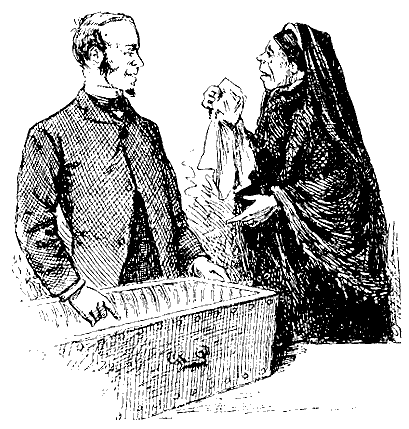
Illustration
from first edition of LIFE ON THE MISSISSIPPI
The undertaker also goes into detail explaining why a disease epidemic is
actually bad for business and how additional profits can be made with ice
and "embamming":
"Well, in ordinary times, a person dies, and we lay him
up in ice; one day, two days, maybe three, to wait for friends to come. Takes
a lot of it -- melts fast. We charge jewelry rates for that ice, and war prices
for attendance. Well, don't you know, when there's an epidemic, they rush
'em to the cemetery the minute the breath's out. No market for ice in an epidemic.
Same with Embamming. You take a family that's able to embam, and you've got
a soft thing. You can mention sixteen different ways to do it -- though there
ain't only one or two ways, when you come down to the bottom facts of it --
and they'll take the highest-priced way, every time. It's human nature --
human nature in grief. It don't reason, you see. 'Time being, it don't care
a dam. All it wants is physical immortality for deceased, and they're willing
to pay for it. All you've got to do is to just be ca'm and stack it up --
they'll stand the racket. Why, man, you can take a defunct that you couldn't
give away; and get your embamming traps around you and go to work;
and in a couple of hours he is worth a cool six hundred -- that's what he's
worth. There ain't anything equal to it but trading rats for di'monds in time
of famine. Well, don't you see, when there's an epidemic, people don't wait
to embam. No, indeed they don't; and it hurts the business like hellth, as
we say -- hurts it like hell-th, health, see? -- our little joke in
the trade. Well, I must be going. Give me a call whenever you need any --
I mean, when you're going by, some time."
In his joyful high spirits, he did the exaggerating himself, if any had
been done. I have not enlarged on him (Life on the Mississippi, pp.
440 - 41).
Clemens ended Chapter 43 with the comment, "As for me, I hope to be
cremated" and included an illustration of himself burning in a fire with
his left arm raised as if in protest. In the background is a cemetery with
graves and mourners over an open coffin.
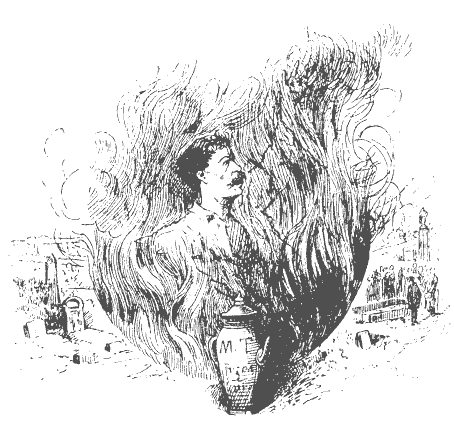
Illustration
from first edition of LIFE ON THE MISSISSIPPI
later removed at Livy Clemens's request.
Life on the Mississippi had already gone into production
in early 1883 when Livy Clemens saw the illustration depicting her husband's
cremation. She insisted the printing be stopped and the illustration removed.
Clemens abided by his wife's wishes. Copies of Life on the Mississippi
published by James R. Osgood which contain the cremation illustration are
prized by today's book collectors. The exact number printed prior to Livy's
halting of the presses remains unknown.
Clemens ended his 1882 tour of the Mississippi River in St.
Paul, Minnesota, a city founded by Pierre Parrant, a Canadian who, "built
a cabin, uncorked his jug and began to sell whiskey to the Indians."
Chapter 60 of Life on the Mississippi, the final chapter of the book,
contains one last mention of undertakers as Clemens discusses the march of
civilization and the place of undertakers in that parade:
How solemn and beautiful is the thought that the earliest pioneer of civilization,
the van-leader of civilization, is never the steamboat, never the railroad,
never the newspaper, never the Sabbath-school, never the missionary -- but
always whiskey! Such is the case. Look history over; you will see. The missionary
comes after the whiskey -- I mean he arrives after the whiskey has arrived;
next comes the poor immigrant, with ax and hoe and rifle; next, the trader;
next, the miscellaneous rush; next, the gambler, the desperado, the highwayman,
and all their kindred in sin of both sexes; and next, the smart chap who
has bought up an old grant that covers all the land; this brings the lawyer
tribe; the vigilance committee brings the undertaker. All these interests
bring the newspaper; the newspaper starts up politics and a railroad; all
hands turn to and build a church and a jail -- and behold! civilization
is established forever in the land (Life on the Mississippi, p. 586).
After completion of Life on the Mississippi, Clemens
turned his attention to completion of what would become his most famous and
controversial work.
_____
Adventures of Huckleberry Finn - 1884
Shortly after the success of The Adventures of Tom Sawyer,
Clemens decided to begin a sequel to that novel. He worked on the manuscript
of Huckleberry Finn intermittently for a period of about eight years.
Extracts from the finished manuscript and forthcoming book were published
in Century Magazine beginning in December 1884. Clemens, who had now
formed his own publishing company, released the book under his own imprint
Charles L. Webster and Company in February 1885. The story of the young boy
named Huckleberry Finn who helps a black slave escape down the Mississippi
River is written in authentic American vernacular. An examination of Clemens's
manuscript indicates he worked unceasingly to capture the first person voice
and viewpoints of a simple, naive and uneducated Huckleberry Finn who narrates
the story and describes the local folks who live along the river..
In Chapter 17 of Huckleberry Finn Huck meets the family
of a young deceased girl named Emmeline Grangerford who had been obsessed
with writing funeral tributes and poetry honoring the dead -- and even more
eager for the opportunity to write it than the undertaker was to get the dead
body.
Every time a man died, or a woman died, or a child died, she
would be on hand with her "Tribute" before he was cold. She called
them Tributes. The neighbors said it was the doctor first, then Emmeline,
then the undertaker -- the undertaker never got in ahead of Emmeline but once,
and then she hung fire on a rhyme for the dead person's name, which was Whistler.
She warn't ever the same after that; she never complained, but she kinder
pined away and did not live long (Adventures of Huckleberry Finn, p.
140).
Chapter 27 of Huckleberry Finn features Huck at a funeral
for Peter Wilks. Clemens wrote into the story one of the most memorable undertakers
in American literature.
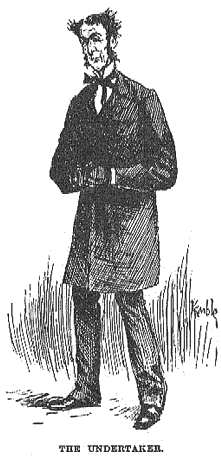
Towards
the middle of the day the undertaker come with his man, and they set the coffin
in the middle of the room on a couple of chairs, and then set all our chairs
in rows, and borrowed more from the neighbors till the hall and the parlor
and the dining-room was full. ...
Then the people begun to flock in ....When the place was packed
full the undertaker he slid around in his black gloves with his softy soothering
ways, putting on the last touches, and getting people and things all ship-shape
and comfortable, and making no more sound than a cat. He never spoke; he moved
people around, he squeezed in late ones, he opened up passageways, and done
it with nods, and signs with his hands. Then he took his place over against
the wall. He was the softest, glidingest, stealthiest man I ever see; and
there warn't no more smile to him than there is to a ham.
They had borrowed a melodeum -- a sick one; and when everything
was ready a young woman set down and worked it; and it was pretty skreeky
and colicky, and everybody joined in and sung, and Peter was the only one
that had a good thing, according to my notion. Then the Reverend Hobson opened
up, slow and solemn, and begun to talk; and straight off the most outrageous
row busted out in the cellar a body ever heard; it was only one dog, but he
made a most powerful racket, and he kept it up right along; the parson he
had to stand there, over the coffin, and wait -- you couldn't hear yourself
think. It was right down awkward, and nobody didn't seem to know what to do.
But pretty soon they see that long-legged undertaker make a sign to the preacher
as much as to say, "Don't you worry -- just depend on me." Then
he stooped down and begun to glide along the wall just his shoulders showing
over the people's heads. So he glided along, and the powwow and racket getting
more and more outrageous all the time; and at last, when he had gone around
two sides of the room, he disappears down cellar. Then in about two seconds
we heard a whack, and the dog he finished up with a most amazing howl or two,
and then everything was dead still, and the parson begun his solemn talk where
he left off. In a minute or two here comes this undertaker's back and shoulders
gliding along the wall again; and so he glided and glided around three sides
of the room, and then rose up, and shaded his mouth with his hands, and stretched
his neck out towards the preacher, over the people's heads, and says, in a
kind of a coarse whisper, "He had a rat!" Then he drooped
down and glided along the wall again to his place. You could see it was a
great satisfaction to the people, because naturally they wanted to know. A
little thing like that don't cost nothing, and it's just the little things
that makes a man to be looked up to and liked. There warn't no more popular
man in town than what that undertaker was.
Well, the funeral sermon was very good, but pison long and tiresome;
and then the king he shoved in and got off some of his usual rubbage, and
at last the job was through, and the undertaker begun to sneak up on the coffin
with his screw-driver. I was in a sweat then, and watched him pretty keen.
But he never meddled at all; just slid the lid along as soft as mush, and
screwed it down tight and fast. (Adventures of Huckleberry Finn, pp.
231-33).
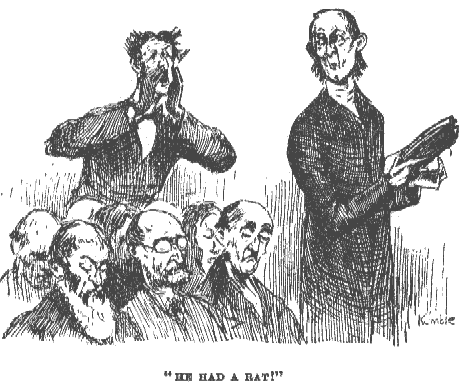
Illustrations
of the undertaker from first edition of ADVENTURES OF HUCKLEBERRY FINN
|
Huck describes the undertaker as wearing black gloves and being the "softest,
glidingest, stealthiest man I ever see" -- a description that could be
well applied to a burglar. The description of the undertaker being "long-legged"
also invokes memories of Clemens's old target Charles Coffin Harris. When the
undertaker silences the barking dog with a whack and the dog sounds out an "amazing
howl" followed by "dead still" the reader is left to imagine
what sort of injury the undertaker inflicted on the dog. Huck's admiration for
the undertaker rises when the undertaker explains the commotion was caused by
a rat and Huck's curiosity on that point is satisfied. After the funeral eulogy
is over, the description of the undertaker sneaking up on the coffin with his
screw-driver again reinforces the image of a burglar. Huck's admiration for
the undertaker is testimony to his innocence and the passage also allows Clemens
another opportunity to make the undertaker profession a target for his satire.
An examination of the original manuscript of Adventures of Huckleberry Finn
indicates Clemens worked carefully to capture the description of the undertaker
-- often revising his passages. He first described the undertaker as having
no more smile than a "wax figger" but cancelled those words and wrote
"ham."

Portion of
leaf 304 of the original manuscript of ADVENTURES OF HUCKLEBERRY FINN.
A few paragraphs later Clemens cancels the first few words of
a paragraph related to the undertaker, "I judged he was a ...." This
particular thought is never completed and whether Clemens changed Huck's attitude
toward the undertaker from one of dismay to admiration will remain a mystery.
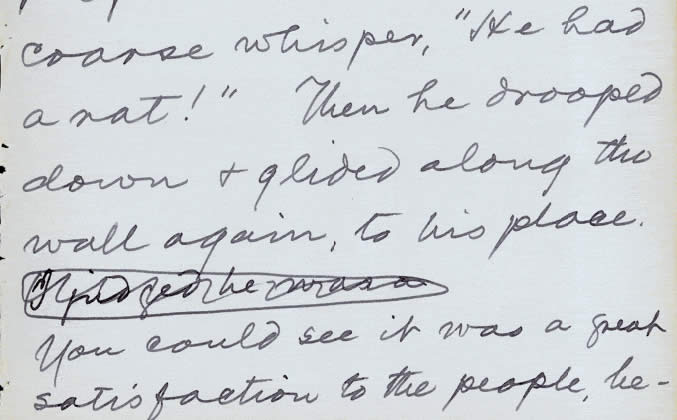
Portion of
leaf 307 of original manuscript of ADVENTURES OF HUCKLEBERRY FINN.
Clemens also fine-tuned his wording to reinforce the image of
a thief -- having first written "the undertaker begun to slip up on the
coffin" he changed the wording to read "sneak up on the coffin..."

Portion of
leaf 308 of original manuscript of ADVENTURES OF HUCKLEBERRY FINN.
Overall, the examination of the original manuscript pages related
to the undertaker passage in Adventures of Huckleberry Finn indicates
that Clemens carefully and deliberately crafted his description of that character.
_____
A Connecticut Yankee in King Arthur's Court
- 1889
Clemens's next major book following the publication of Adventures
of Huckleberry Finn was A Connecticut Yankee in King Arthur's Court.
The novel, a story of time travel back to the days of King Arthur in sixth-century
Camelot, features a nineteenth-century Connecticut resident named Hank Morgan.
Hank attempts to transplant his notions of modern technology and politics
into England. In Chapter 9, when Hank considers starting a newspaper, he looks
for the proper qualifications in a reporter who can write local news. He finds
them in a priest who once worked in the undertaker-department of his church:
Well, the priest did very well, considering. He got in all the
details, and that is a good thing in a local item: you see he had kept books
for the undertaker-department of his church when he was younger, and there,
you know, the money's in the details; the more details, the more swag: bearers,
mutes, candles, prayers -- everything counts; and if the bereaved don't buy
prayers enough you mark up your candles with a forked pencil, and your bill
shows up all right (A Connecticut Yankee in King Arthur's Court, p.
109-110).
In one swipe, Clemens had yoked undertakers and organized religion together
in his satire -- another "double decapitation" as Mark Twain scholar
Edgar Branch might describe it.
In Chapter 23, titled "The First Newspaper" Hank reacts to the first
published news reports:
Yes, it was too loud. Once I could have enjoyed it and seen nothing out of
the way about it, but now its note was discordant. It was good Arkansas journalism,
but this was not Arkansas. ... Indeed, there was too lightsome a tone of flippancy
all through the paper. It was plain I had undergone a considerable change
without noticing it. I found myself unpleasantly affected by pert little irreverencies
which would have seemed but proper and airy graces of speech at an earlier
period of my life. There was an abundance of the following breed of items,
and they discomforted me: ...
The bdsiness end of the funeral of the late Sir Dalliance the duke's son
of Cornwall, killed in an encounter with the Giant of the Knotted Bludgeon
last Tuesday on the borders of the Plain of Enchantment was in the hands of
the ever affable and efficient Mumble, prince of undertakers, than whom there
exists none by whom it were a more satisfying pleasure to have the last sad
offices performed. Give him a trial (A Connecticut Yankee in King Arthur's
Court, p. 257-59).
Even in a Camelot setting, Clemens could not resist featuring a satisfied undertaker.
_____
"About All Kinds of Ships" - 1893
Financial setbacks forced the Clemens family to close their
Hartford mansion and relocate to Europe in 1891. Sam Clemens made several
trans-Atlantic crossings during the years 1891 through 1893 as he traveled
back and forth to the United States to manage his business interests. In June
1892 Clemens sailed for America from Germany on board the Havel, a
state-of-the-art passenger ship with some of the most modern advancements
in passenger comfort. The voyage aboard the Havel inspired Clemens
to write an essay titled "About All Kinds of Ships." In the essay
Clemens engages in a reverie about the modern conveniences of the Havel
which leads him to thoughts of what a German ship inspector might have said
about Noah's old ark.
"Passengers?"
"Eight."
"Sex?"
"Half male, the others female."
"Ages?"
"From a hundred years up."
"Up to where?"
"Six hundred."
"Ah - going to Chicago; good idea, too. Surgeon's name?"
"We have no surgeon."
"Must provide a surgeon. Also an undertaker -- particularly the undertaker.
These people must not be left without the necessities of life at their age
(The £1,000,000 Bank-Note and Other New Stories, p. 165).
Clemens continued his essay with a discussion of one of Columbus's ship comparing
its sleeping arrangements to coffins:
...there was only about one stateroom, the size of a grave, with a tier
of two or three berths in it of the dimensions and comfortableness of coffins
... After his final meal he returned thanks for his many blessings, a little
overrating their value, perhaps, and then he laid off his silken splendors
or his gilded hardware, and turned in, in his little coffin-bunk (The
£1,000,000 Bank-Note and Other New Stories, p. 172, 175).
It is possible Clemens intended to sell "About All Kinds of Ships"
to the McClure newspaper syndicate which had previously published six
of his travel letters in 1891 and 1892. However, no newspaper printing
of the essay has yet been found. The essay was included in The £1,000,000
Bank-Note and Other New Stories published by Clemens's own Charles L.
Webster and Company in 1893.
_____
Pudd'nhead Wilson
and
Those Extraordinary Twins - 1894
In 1891 the Clemens family was living in Europe and Sam saw
the famous Siamese twins -- the Tocci brothers. Born in Italy in the mid-1870s,
the twins Giovanni and Giacomo who were joined at their ribcage, were exhibited
in sideshows through Europe.
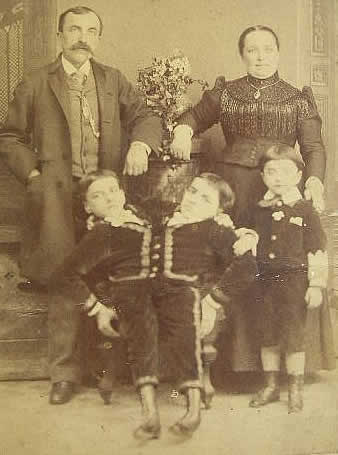
The Tocci
family featuring the Siamese twins Giovanni and Giacomo.
Inspired by the twins, Clemens wrote a manuscript which he sometimes
referred to as Those Extraordinary Twins; other times he referred to
the title as Pudd'nhead Wilson. The story began as a comedy -- a burlesque
story of Siamese twins whom he named Luigi and Angelo Cappello, each with
a distinct personality. However, the twins' storyline was soon eclipsed by
other characters surfacing in Clemens's creative imagination including a mulatto
slave named Roxy, her son Tom and a lawyer named David "Pudd'nhead"
Wilson. Clemens eventually extracted the story of the Siamese twins from the
tale of Roxy and her son and revised them into minor characters who were ordinary
twins. Clemens also made his character of David "Pudd'nhead" Wilson
a writer of a "whimsical almanac" or "calendar" containing
profound and ironic maxims which confound the local citizens. From December
1893 to June 1894 Century Magazine serialized Pudd'nhead Wilson.
Each installment in Century contained small calendars which incorporated
the Pudd'nhead maxims.
Clemens arranged to have Pudd'nhead Wilson published
by the American Publishing Company, his own publishing company of Charles
L. Webster having fallen into bankruptcy in April 1894. Rather than issue
Pudd'nhead Wilson calendars with the book version of the story, Clemens wanted
to use the calendar's maxims as chapter headings which would match the content
of the chapters. However, not all of the maxims have a direct relation to
the book's chapters. For Chapter 6 of Pudd'nhead Wilson, Clemens inserted
the introductory maxim, "Let us endeavor so to live that when we come
to die even the undertaker will be sorry." The maxim stands in sharp
contrast to the chapter's contents which describes a festive reception for
the Cappello twins.
In order to make his book larger and more attractive to buyers,
Clemens decided to also include his earlier story of the Siamese twins titled
Those Extraordinary Twins -- the story he had originally edited out
of Pudd'nhead Wilson. He also added his own introduction and some final
remarks about the excised story. In November 1894 the American Publishing
Company issued the two separate stories in a lavishly illustrated volume titled
The Tragedy of Pudd'nhead Wilson and the Comedy Those Extraordinary Twins.
| Chapter 7 of Those Extraordinary Twins features a doctor who
writes a prescription to treat one of the injured Siamese twins. In describing
the doctor's poor handwriting, Clemens once again mentioned the profits
to made in the undertaker profession, "...he wrote a doctor's hand
-- the hand which from the beginning of time has been so disastrous to
the apothecary and so profitable to the undertaker" (The Tragedy
of Pudd'nhead Wilson and the Comedy Those Extraordinary Twins, p.
411). The illustrator for the passage chose to depict a large array of
medicines leading to a skull and crossbones and circling upwards on the
page to a covered casket. |
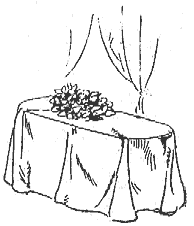 |
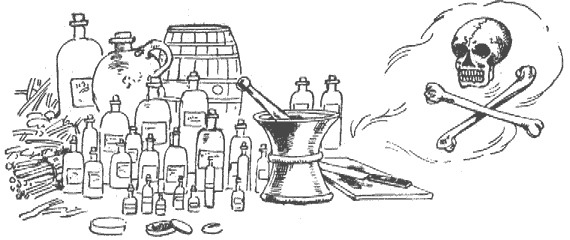 Illustrations
from the first edition of
Illustrations
from the first edition of
THE TRAGEDY OF PUDD'NHEAD WILSON AND THE COMEDY THOSE EXTRAORDINARY TWINS.
_____
Following the Equator - 1897
Following the bankruptcy of his own publishing house Charles
L. Webster and Company, Clemens devised a means of paying off creditors and
removing the stigma of bankruptcy from his family's name. He decided to lecture
his way around the world. His name was a popular draw and could fill lecture
halls worldwide with people willing to pay to see him and be entertained for
a few hours. Along with his wife Livy and daughter Clara, he embarked on an
around-the-world lecture tour which would last one year. He began the tour
in July 1895 in North America at Cleveland, Ohio and concluded it in South
Africa in July 1896.
From Africa, the Clemenses sailed to England where he intended
to settle and complete a travel book about his world tour. Clemens's daughter
Susy, who had remained in the United States while her father and mother were
abroad, died the following month August 1896 without seeing her parents for
more than a year. Following the family tragedy, Clemens tried to console himself
through his writing. He later confessed to his friend William Dean Howells
that he had been "in hell" while working on the book.
Clemens often transferred passages from his personal journal
kept while on tour into his book manuscript. Shortly after New Year's Day
in 1896 the sight of a red-headed vulture reminded him of an undertaker.
January 4, 1896 - ... Lying here at anchor all day -- Albany (King George's
Sound), Western Australia. ... A vulture on board; bald, red, queer-shaped
head, featherless red places here and there on his body, intense great
black eyes set in featherless rims of inflamed flesh; dissipated look;
a business-like style, a selfish, conscienceless, murderous aspect --
the very look of a professional assassin, and yet a bird which does no
murder. What was the use of getting him up in that tragic style for so
innocent a trade as his? For this one isn't the sort that wars upon the
living, his diet is offal -- and the more out of date it is the better
he likes it. Nature should give him a suit of rusty black; then he would
be all right, for he would look like an undertaker and would harmonize
with his business; whereas the way he is now he is horribly out of true
(Following the Equator, pp. 334 - 35).
|

A red-headed
vulture reminded Clemens of an undertaker. From an illustration by Audubon. |
The same day, January 4, 1896, an interview with him appeared
in the Sydney Bulletin wherein he commented on the need to contrast
humor with grief in order to achieve the greatest effect::
It is not true that owing to my lack of humor I was once discharged
from a humorous publication. It's an event that could very likely happen were
I on the staff of a humorous paper -- but then I'd never get into a fix like
that. I'd never undertake to be humorous by contract. If I wanted my worst
enemy to be racked I'd make him the editor of a comic paper. For me there
must be contrast; for humorous effect I must have solemn background; I'd let
my contribution into an undertaker's paper or the London Times. Set
a diamond upon a pall of black if you'd have it glisten.
(Mark Twain's Interviews, p. 266).
From Australia, Clemens traveled to India where he delivered
about twenty lectures between January and late March. It was most likely in
India that he purchased a copy of a book titled In the Himalayas and on
the Indian Plains (1886) by Constance Frederica Gordon-Cumming. Clemens
later used the book as a reference source when he was writing Following
the Equator. He filled the book with notes and marginalia including one
which read:
We must take the position that burial is stuck to merely in
the interest of the undertaker (who has his family cremated to save expense)
(Gribben, p. 268).
Following the Equator was published by American Publishing
Company in November 1897. Clemens's British publisher Chatto published the
book simultaneously under the title More Tramps Abroad which included
less editing of passages than the American version of the book. Clemens also
included more Pudd'nhead Wilson calendar maxims as chapter headings. For Chapter
10 devoted to Australia, Puddn'head Wilson's New Calendar heading is, "Everything
human is pathetic. The secret source of Humor itself is not joy but sorrow.
There is no humor in heaven" (Following the Equator, p. 119).
Clemens had the ability to analyze and dissect what made people laugh. And
he continued to use the undertaker's profession and its association with sorrow
to his advantage.
"The Day We Celebrate" - July 4, 1899
Throughout 1899 the Clemens family lived in Vienna, London and
Sweden. The celebrated the Fourth of July that year in London with other Americans
who were living abroad. Clemens was asked to participate in the speechmaking
at a celebration held at London's Hotel Cecil along with other noted dignitaries.
Making fun of the undertaker was a small part of his planned entertainment
that evening:
The business aspects of the Fourth of July is not perfect as it stands.
See what it costs us every year with loss of life, the crippling of thousands
with its fireworks, and the burning down of property. It is not only sacred
to patriotism and universal freedom, but to the surgeon, the undertaker,
the insurance offices - and they are working it for all it is worth.
Newspaper accounts of the speech are lacking. However, the text of the planned
speech survived and was first published by Harper and Brothers in 1910 in
Mark Twain's Speeches.
_____
"Christian Science and the Book of Mrs. Eddy"
- 1899
The Clemenses youngest daughter Jean suffered from epilepsy
and from mid-July to September 1899 she received treatment for the malady
in Sanna, Sweden. During this time Clemens developed an interest in the Christian
Science, a religion founded twenty years earlier by Mary Baker Eddy. Eddy's
doctrine taught that physical illness could be cured by the human mind. While
Eddy's theories appealed to Clemens, he had doubts about the religious foundations
Christian Science was built on and disliked Eddy's incomprehensible writings
on the topic. In October 1899 he published his first articles on Christian
Science in Cosmopolitan magazine. He wrote:
It is elegant. And it is a fine thought, too -- marrying religion to medicine,
instead of medicine to the undertaker in the old way; for religion and medicine
properly belong together, they being the basis of all spiritual and physical
health.
Binding together medicine and the undertaker was similar to
the idea Clemens had earlier expressed in Those Extraordinary Twins when
he described a doctor's poor handwriting that often led to apothecary mistakes
and profit for the undertaker. Clemens would continue to write critiques about
Mary Baker Eddy and Christian Science over the next several years. These were
later incorporated into a book published by Harper and Brothers in 1907 titled
Christian Science with Notes Containing Corrections to Date.
_____
Speech for New York Post Graduate Medical School and Hospital
- January 20, 1909
Samuel Clemens and his family moved from Europe back to the
United States in October 1900. They resided in New York until Livy's health
declined and forced them to seek the milder climates in Itay in 1903. After
Livy's death in 1904, Sam returned to New York once again. In 1907 Clemens
was awarded an honorary doctorate of laws degree from Oxford University. In
1908 Clemens moved into a custom built country home in Redding, Connecticut.
He continued to enjoy popularity as an after dinner speaker.
In January 1909 he spoke before the annual dinner of the Directors
and Faculty of the New York Post Graduate Medical School and Hospital at Delmonico's
in New York. According to The
New York Times
report of the event, he told of the imaginary establishment of the Post-Graduate
School of medicine at his home in Redding, Connecticut. The other members
of the Faculty included himself, a horse doctor and an undertaker. While no
exact text exists of the speech Clemens actually delivered, his notes for
it survived. One version of the speech was published by Harper and Brothers
in 1910.
Of course, the practice of medicine and surgery in a remote country district
has its disadvantages, but in my case I am happy in a division of responsibility.
I practise in conjunction with a horse-doctor, a sexton, and an undertaker.
The combination is air-tight, and once a man is stricken in our district
escape is impossible for him.
These four of us -- three in the regular profession and the fourth an undertaker
-- are all good men. There is Bill Ferguson, the Redding undertaker. Bill
is there in every respect. He is a little lukewarm on general practice,
and writes his name with a rubber stamp. Like my old Southern friend, he
is one of the finest planters anywhere.
Then there is Jim Ruggles, the horse-doctor. Ruggles is one of the best
men I have got. He also is not much on general medicine, but he is a fine
horse-doctor. Ferguson doesn't make any money off him.
You see, the combination started this way. When I got up to Redding and
had become a doctor, I looked around to see what my chances were for aiding
in the great work. The first thing I did was to determine what manner of
doctor I was to be. Being a Connecticut farmer, I naturally consulted my
farmacopia, and at once decided to become a farmeopath.
Then I got circulating about, and got in touch with Ferguson and Ruggles.
Ferguson joined readily in my ideas, but Ruggles kept saying that, while
it was all right for an undertaker to get aboard, he couldn't see where
it helped horses (Mark Twain's Speeches, p. 335).
Clemens's speech reflects an almost complete transformation from rancor to
mild humor on the topic of undertakers. This sort of transformation is one
that Clemens described in an interview published November 26, 1905 in New
York Sunday World Magazine, about a year and a half after Livy's death.
What is it that strikes a spark of humor from a man? It is the effort to
throw off, to fight back the burden of grief that is laid on each one of
us. In youth we don't feel it, but as we grow to manhood we find the burden
on our shoulders. Humor? It is nature's effort to harmonize conditions.
The further the pendulum swings out over woe the further it is bound to
swing back over mirth (Mark Twain's Interviews, p. 522-23).
Clemens had probably reconciled himself to the fact that the undertaker would
be in his own future and it would be best to approach that day with a tinge
of humor.
_____
A Final Interview - 1910
Sam Clemens's youngest daughter Jean died in her bathtub at
Redding on December 24, 1909. His health prevented him from attending her
funeral and burial in Elmira. He spent the next few days writing an essay
titled "The Death of Jean." The essay avoids all mention of undertakers.
Clemens then retreated to Bermuda, his health continuing to spiral downward.
On March 5, 1910 newspapers reported what is perhaps one of
the very last comments he gave to a newspaper reporter in Bermuda which was
reported in newspapers across the United States, "I am able to say that
while I am not ruggedly well, I am not ill enough to excite an undertaker"
("Mark Twain Doing Nicely,"Aberdeen Daily News, 5
March 1910, p. 2).
Clemens's health continued to fail as his heart condition worsened.
Shortly before he sailed back to the United States he wrote his friend, caretaker
and biographer Albert Bigelow Paine:
We are booked to sail in the "Bermudian" April 23rd, but don't
tell anybody, I don't want it known. I may have to go sooner if the pain
in my breast doesn't mend its ways pretty considerably. I don't want to
die here for this is an unkind place for a person in that condition. I should
have to lie in the undertaker's cellar until the ship would remove me and
it is dark down there and unpleasant.
The Colliers will meet me on the pier and I may stay with them a week or
two before going home. It all depends on the breast pain -- I don't want
to die there. I am growing more and more particular about the place (Mark
Twain's Letters, Paine, ed., p. 842).
However, Clemens's health declined rapidly and Paine traveled to Bermuda
to be with him on a return voyage to the United States. They left Bermuda
on April 12 and reached New York on April 14. Clemens died in his home at
Redding, Connecticut on April 21, 1910.
_____
Mark Twain's Funeral Expenses
Samuel Clemens's sole survivor was his daughter Clara. It is
likely she was assisted by Albert Bigelow Paine in making her father's funeral
arrangements. According to the information published online by Brent Colley
at the Mark
Twain Stormfield Project, Clemens's funeral was handled by Bouton
& Son Funeral Home, West Church Street, Georgetown, Connecticut. The expenses
totaled $703.30 and included a mahogany casket, embalming, and transportation
to Elmira, New York with a stop off in New York City for services. Services
in New York were held at Brick Church, at Fifth Avenue and Thirty-Seventy
Street where more than 3,000 people gathered to say a final farewell. The
New York Times
reported the ushers for the funeral were "undertaker's men."
Calculating for inflation, the funeral expenses for Sam Clemens would total
about $16,000 in year 2007.
_____
In Conclusion
Clemens's early references to undertakers in his work are made
in jest and with good-natured humor. After the death of Jennie Clemens in
1864, Clemens's tone took on a defiant, argumentative, combative stance against
the trade. This stance was often disguised as humor. Clemens's insights into
humor came to be built around the theory that humor was the best way to fight
grief and achieve psychological harmony.
As to Jennie Clemens, paranormal researcher and historian Richard
Senate has investigated claims that Jennie's ghost has been seen around the
Carson City cemetery where she is buried. He has also investigated the reports
that a figure appearing to be Mark Twain has been seen in Orion's old home
in Carson City visiting the room believed to be Jennie's bedroom -- the room
where the name "Mark Twain" was first signed to a news article.
_____
REFERENCES:
Anderson, Frederick; Michael B. Frank; and Kenneth M. Sanderson,
eds. Mark Twain's Notebooks & Journals: Volume I (1855 - 1873).
(University of California Press, 1975).
Anderson, Frederick; Lin Salamo and Bernard Stein, eds. Mark
Twain's Notebooks & Journals: Volume II (1877 - 1883). (University
of California Press, 1975).
Berkove, Lawrence I. The Sagebrush Anthology. (University
of Missouri Press, 2006) [annotation on Samuel Wright, p. 96].
Branch, Edgar M., ed. Clemens of the Call. (University
of California Press, 1969).
Branch, Edgar M., Michael B. Frank, and Kenneth Sanderson, eds.
Mark Twain's Letters, Volume 1, 1853 - 1866. (University of California
Press, 1988). Also online at http://www.marktwainproject.org
Budd, Louis J., ed. Mark Twain: Collected Tales, Sketches,
Speeches, & Essays 1891 - 1910, (Library of America, 1992).
Clark, Walter Van Tilburg, ed. The Journals of Alf Doten
1849 - 1903, Volumes 1 - 3. (University of Nevada Press, 1973).
Cobb, A. G. "Earth-burial and Cremation," North
American Review, September 1882.
Colley, Brent M. "Funeral
Expenses," Mark Twain Stormfield Project, 1908 - 2008 (February
2, 2008). Online at http://twainproject.blogspot.com
David, Beverly R. Mark Twain and His Illustrators, Volume
II (1875 - 1883). (Whitston Publishing Company, 2001).
"Death of S. C. Wright," Reno (Nevada) Evening
Gazette, 1 August 1892.
Fanning, Philip. Mark Twain and Orion Clemens. (University
of Alabama Press, 2003).
Fatout, Paul. Mark Twain Speaking. (University of Iowa
Press, 1977).
Fischer, Victor and Michael B. Frank, eds. Mark Twain's Letters,
Volume 4, 1870 - 1871. (University of California Press, 1995). Also online
at http://www.marktwainproject.org
Frank, Michael B. and Harriet Elinor Smith, eds. Mark Twain's
Letters, Volume 6, 1874 - 1875. (University of California Press, 2002). Also
online at http://www.marktwainproject.org
Gribben, Alan. Mark Twain's Library: A Reconstruction.
(G. K. Hall & Co., 1980).
"History," The Civil War Undertaker. Online
at: http://www.civilwarundertaker.net/history.htm
(accessed 5 June 2008).
Huck Finn: The Complete Buffalo & Erie County Public
Library Manuscript - Teaching and Research Digital Edition (Buffalo &
Erie County Public Library, 2003).
"The Late Justice Harris of Hawaii," The New York
Times, 27 July 1881, p. 3.
LeMaster, J. R. and James D. Wilson, The Mark Twain Encyclopedia.
(Garland Publishing Company, 1993).
Mack, Effie Mona. Mark Twain in Nevada. (Charles Scribner's
Sons, 1947).
_____. "Orion Clemens," Nevada Historical Society
Quarterly, Vol. 4, 1961.
"Mark Twain Doing Nicely," Aberdeen (South
Dakota) Daily News, 5 March 1910, p. 2.
Mark
Twain Project online database of letters and works.
McCullough, Joseph B. and Janice McIntire-Strasburg, eds. Mark
Twain at the Buffalo Express. (Northern Illinois University Press, 1999).
McKeithan, Daniel Morley, ed. Traveling with the Innocents
Abroad: Mark Twain's Original Reports from Europe and the Holy Land. (University
of Oklahoma Press, 1958).
Miller, William C. "Samuel L. and Orion Clemens vs. Mark
Twain and His Biographers (1861 - 1862)," Mark Twain Journal,
Summer 1973.
Paine, Albert Bigelow. Mark Twain: A Biography - 4 volumes.(
Harper and Brothers, 1912).
_____. Mark Twain's Letters - 2 volumes (Harper and Brothers,
1917).
Railton, Stephen. Mark Twain in His Times. Online at:
http://etext.virginia.edu/railton/index2.html
(accessed 12 June 2008).
Rasmussen, Kent. Critical Companion to Mark Twain. (Facts
on File, 2007).
Reigstad, Thomas J. Scribblin' For a Livin': Mark Twain's
Pivotal Period in Buffalo. (Prometheus Books, 2013).
Salamo, Lin and Harriet Elinor Smith, eds. Mark Twain's Letters,
Volume 5, 1872 - 1873. (University of California Press, 1997). Also online
at http://www.marktwainproject.org
Scharnhorst, Gary, ed. Mark Twain: The Complete Interviews.
(University of Alabama Press, 2006).
Senate, Richard. "Does the Ghost of Mark Twain Walk Carson
City, Nevada?" Fate, July 2007.
Smith, Henry Nash. Mark Twain of the Enterprise. (University
of California Press, 1957).
Smith, Henry Nash and William M. Gibson, Mark Twain - Howells
Letters, Volume 1. (Belknap Press, 1960).
Twain, Mark. Adventures of Huckleberry Finn. (The
Works of Mark Twain edition, University of California Press, 2003).
_____. A Connecticut Yankee in King Arthur's Court. (Oxford
University Press, 1996).
_____. Following the Equator. (Oxford University Press,
1996).
_____. The Innocents Abroad. (Oxford University
Press, 1996)
_____. Life on the Mississippi. (Oxford University Press,
1996).
_____. Roughing It. (Mark Twain Library edition,
University of California Press, 1996).
_____. Mark Twain's Speeches. (Oxford University Press,
1996).
_____. Sketches New and Old. (Oxford University Press,
1996).
_____. The Tragedy of Pudd'nhead Wilson and the Comedy Those
Extraordinary Twins. (Oxford University Press, 1996).
_____. A Tramp Abroad. (Oxford University Press, 1996).
United States Census, 1880, Elmira, New York from ancestry.com.
Wecter, Dixon. Sam Clemens of Hannibal. (Houghton Mifflin
Company, 1961).
_____



















 Towards
the middle of the day the undertaker come with his man, and they set the coffin
in the middle of the room on a couple of chairs, and then set all our chairs
in rows, and borrowed more from the neighbors till the hall and the parlor
and the dining-room was full. ...
Towards
the middle of the day the undertaker come with his man, and they set the coffin
in the middle of the room on a couple of chairs, and then set all our chairs
in rows, and borrowed more from the neighbors till the hall and the parlor
and the dining-room was full. ... 







